The story of Stiff, the most anarchic record label of all time
Drugs, fisticuffs and a signing policy that included Motörhead: the inside story behind Stiff Records
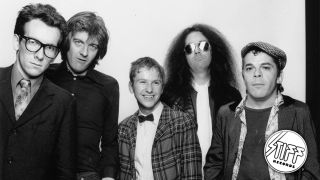
On July 26, 1977, bang in the middle of the summer of punk , a flatbed Ford truck pulls up outside the London Hilton where the cream of the CBS record company are holding a high-level conference. A slight fellow sporting geeky Buddy Holly glasses and wearing a dark shirt and tie emerges from the passenger side clutching a guitar and a small amplifier. He sets himself up busker-style and proceeds to blast the bemused executives with a selection of rapid-fire, snarling ditties which he intersperses with the barked command: “I am Elvis Costello. Sign me!”
Meanwhile, West End police have just received an anonymous tip-off from a man with a decidedly Irish accent telling them that another Irishman of dodgy countenance is causing trouble on Park Lane. With the IRA’s bombing campaign subjecting London to non-stop paranoia and the Queen’s Silver Jubilee shenanigans turning England into a virtual police state, alarm bells go off. An unmarked police car arrives and promptly arrests Costello, who turns Queen’s Evidence and tells them to call his employers, Stiff Records of Alexander Street W2. But when the desk sergeant calls Stiff MD Dave Robinson – who had made the phone call to the fuzz – he tells them he has no idea who Costello is. The hapless Elvis is promptly arrested for causing an obstruction and spends the night fuming in the cells.
“Was he pissed off!” Robinson now recalls. “He got the hump. But then he did get signed to CBS, so that publicity stunt not only got us on the news and in the next day’s papers, it gave him a career.”
Stiff had creative energy, and we became synonymous with that ‘take it to the Nth degree’ attitude, at a time when the business was dominated by the Eagles. Mickey Gallagher, the Blockheads
Stiff Records was the brainchild of Robinson and his partner Andrew Jakeman, aka Jake Riviera, a couple of sharp-eyed wide-boy hustlers with music business form of their own as managers of the bands Kilburn And The High Roads and Chilli Willi And The Red Hot Peppers respectively. Their acquaintance became cemented in 1975 when English music was snowed under by nondescript guitar bands in thrall to far superior American music, while our local struggling pub rockers operated on the equivalent of the 1950s skittle circuit. Times were dire. Punk was fermenting, if not yet visible, but the smell of revolution was abroad. Robinson decided to exploit this deadly malaise with shock tactics that changed British music completely, and launched the independent music scene.
“There were five weekly music papers desperate for copy,” Robinson points out. “Yet the record companies were clueless hippies. Jake was high on the hog after coming back from America after road managing Dr Feelgood [the Canvey Island R&B nutters who inadvertently kick-started punk], and we’d both been impressed by the growth of small labels in the USA. We were a couple of smart alecs with an ear for a slogan. By spring 1976 we were ready to go.”
Stiff was originally called Demon, but the rock biz phrase ‘It’s a stiff!’ provided a funnier alternative for their stable of misfits. In the long hot summer of 1976 Stiff released their debut single, So It Goes , by former Brinsley Schwartz bassist Nick Lowe, and started fly-posting London with posters declaring ‘If it ain’t Stiff It ain’t worth a fuck’. They also signed The Damned, whose single New Rose became the first officially recognised English punk rock record.

Get the Louder Newsletter
The latest news, features and interviews direct to your inbox, from the global home of alternative music.
Riviera was shepherding The Damned around Britain as part of the Sex Pistols’ ill-fated Anarchy In The UK tour (which also included the Clash as bill openers), but he soon fell out with Pistols mentor Malcolm McLaren. Renowned for his volatile temper and an argumentative streak akin to an oxyacetylene blowtorch, Riviera was adamant that The Damned would trump Johnny Rotten’s mob. In the ensuing war of words Damned bassist Captain Sensible poured petrol on the rivalry when he declared that the Pistols’ single Anarchy In The UK was “Utter shit. We pissed ourselves. It sounded like some redundant Bad Company out-take, with old man Steptoe singing over the top.”
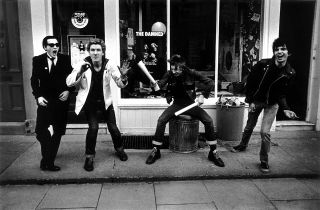
The Damned, the self-styled Bash Street Kids of punk, embodied Stiff’s unpretentious attitude. While McLaren cloaked his charges in situationist theories, Riviera and Robinson were peddling a B-movie/pulp-fiction brand of hard-boiled wit. ‘When you kill time you murder success’ became their mantra. They had it printed on badges. The five music papers acquiesced.
Costello was Stiff Records’ critics’ darling. Born Declan McManus, he’d been signed after demoing 36 songs in three hours at Riviera’s flat. “Jake didn’t like him originally, but we told him to change his name and we’d give it a go”, Robinson says. “Jake came up with ‘Elvis’ because he knew that would piss everyone off. I added the Costello, which was his mother’s maiden name, and told him to get rid of his frameless specs for frames – which became his trademark. Elvis would have done anything he was told then just to get signed. Same with The Damned. They were contrary fuckers but they didn’t want to spend their lives as a semi-pro outfit either. Those people were desperate to be on Stiff because otherwise they were going nowhere.”
The Riviera-Robinson axis lasted for two years. There were many altercations. Robinson remembers: “Jake lost his rag with me once so I took him into the back room, and he was prodding me. I’m slow to burn but I’ve a bad temper. We certainly weren’t good cop/bad cop. Jake had been in the pub, and there was plenty of chemical abuse around, amphetamine sulphate being rife; we all did it… Anyway, I pinned him against the wall and said: ‘Don’t ever talk to me like that again, because you’ll need a lot of people to pull me off, and when they have done you’ll be in a very terrible state.’
“Jake used to shout a lot. His skill was his cutting edge. When he walked away from an argument lesser men felt their bits dropping off. The Police’s manager Miles Copeland once made the mistake of going backstage to show off Sting’s success in America. We almost signed them, but passed because they had a shit French guitarist [Henry Padovani, later replaced by Andy Summers]. Miles made a big mistake. You do not beard Jake when he’s in front of Elvis, because he’ll threaten you when he’s got an audience. He ripped Copeland to pieces. He insulted his band, his clothes and his stupid accent. Miles left the room feeling like a fucking idiot. He called me and asked: ‘Why? What did I do?’ Well, hard luck, Miles. Don’t rub Jake up the wrong way in a dressing room. He’s a bully. You’ve got to stand up to him.”
In autumn 1977 a road show called the Stiffs Live Stiffs tour set off around the UK with Costello, Wreckless Eric, Nick Lowe, Larry Wallis and Ian Dury And The Blockheads in tow. While Dury was gaining many plaudits, Jake and Elvis hatched a plot to leave Stiff and sign to a newly formed label called Radar Records, bankrolled by Warner Brothers.
Robinson was furious. “Our finances were in good shape; we had the CBS deal, and the future looked bright for artists like Ian Dury and Lene Lovich [a prototype rag-doll screecher who begat Cyndi Lauper]. I tried to talk him round, but then I thought: ‘Oh fuck it. Let ’em go.’
“Of course I was annoyed. But I kept the office. And Jake was getting difficult. He’d burnt a lot of bridges even as we stood on them. Lots of people hated us. And there were some discrepancies over advertising: we’d overcooked the books to the tune of 160 grand. But we still had The Damned, and Dury was breaking. We were influential alright. Tony Wilson started the Manchester TV show So It Goes as a result of hearing Nick Lowe. And we inspired Rough Trade and the whole picture sleeve revolution, thanks to our graphic department, headed up by Barney Bubbles, who was mad as a fruitcake but a genius designer.”
In that heady period Stiff got rid of the American major-label sludge and cashed in on the whole street rock alternative of punk and new wave. They were only a flea on the back of a dinosaur. And while they were starting to bite hard, well, so were the creditors.
Salvation arrived in the unlikely shape of Ian Dury. One of the last endemic polio victims in post-war Britain, Dury’s working-class fusion of vaudeville/music-hall nonsense, rhyming slang and his band The Blockheads’ vicious swing made him Stiff’s first superstar. “We went big on [Dury’s] New Boots And Panties!! album,” Robinson recalls. “Luckily Ian gave fantastic copy. We came up with the slogan ‘Give Up Smoking, Give Us Your Money’ for him, and the rest fell into place. Here was this ex-art school nobody who suddenly took off with Reasons To Be Cheerful and Hit Me With Your Rhythm Stick .”
Dury’s fascination with the gangster underworld, and his own chippy propensity for belittling those who he took a dislike to meant that he was surrounded by East End heavies; his minder Fred Rowe, a big, black former villain, became the most obvious example in his freakish entourage.
Naturally aggressive on account of his disability, and the fact he’d had the shit beaten out of him at a home for the mentally disturbed where he was forced into callipers, Duty’s immense talent was offset by a pushy and bullying nature. According to Robinson Dury was fine in one-to-one relationships, but feed him with hashish and brandy and the demons emerged. “He used to antagonise people in bars and get beaten up, so I found him Rowe for his own protection. When the Sex and Drugs And Rock’n’Roll single came out he started making serious money, and Fred had to save his arse more and more frequently.
“Trouble was, his manager, Pete Jenner [who had looked after Pink Floyd], was of the don’t-tell-the-artist-the-truth school. It went pear-shaped when his album Laughter came out [1980], and we laughed him out the door because it was so poor.”
Blockheads keyboards player Mickey Gallagher has great affection for his time with Stiff, while agreeing that Dury could be bloody hard work. “The first Stiff tour was a great success for us,” he says. “We were this eccentric bunch of characters who’d never have seen the light of day without them [the label]. They had creative energy, and we became synonymous with that ‘take it to the Nth degree’ attitude, at a time when the business was dominated by the Eagles – so no change there.
“Ian was an awkward bugger. The first thousand pounds he made with the Kilburns, he burnt. Ian saw himself as the artist. He had an odd temperament; he wouldn’t pander to anyone. He was obsessed with [60s London gangster brothers] the Krays, and if he’d had all his faculties I’ve no doubt he would have been a very nasty piece of work indeed. He made people cry because he was heavy mentally; very caustic. He’d make grown men weep. He’d dig at your family, at your kids, and you couldn’t hit him because he was disabled. Lots of mind games ensued, especially towards any women around the band. He hated seeing any wives or girlfriends. He was a misogynist, so the Blockheads became a boys’ club. That wasn’t pleasant.”
Evidently, to work with Dury you had to take him warts and all. What made him so obnoxious also gave the Blockheads their edge.
“He was a fantastic frontman in front of a very professional musical unit,” Gallagher says. “He expounded violence, so the atmosphere at the gigs was full of testosterone. It was fantastic to be a part of that, but later on, when he’d had too much Guinness and Budweiser, the Devil would come out. He used to bring people down when they wanted to be celebrating. It was a decadent time, lots of sex and drugs coupled with an ultra-punk, fuck-everything attitude. Stiff exploited that brilliantly – they were superb for the artist – although when they locked in with EMI they lost the creative playground. The changing atmosphere affected Ian more than us. At his peak he was a stimulating man, great to be around when he was on form. I liked him, but I never loved him.”
Not all of Stiff’s artists look back on their time on the label with such equanimity. Edward Tudor-Pole, of Tenpole Tudor infamy, had appeared in the Sex Pistols film, playing a cinema usher singing his own composition Who Killed Bambi? based on screenwriter Roger Ebert’s original movie title. Edward was mooted as a replacement for Johnny Rotten when the Pistols fragmented after the Sid Vicious debacle, but decided to front his own band, who he dressed up in suits of armour and any other period costumes he could wangle out of theatrical costumiers. Ideal Stiff fodder, then?
“Not at all,” reckons Eddie today, sounding remarkably like Terry Thomas. “Being signed to Dave Robinson was like entrusting your prized Stradivarius to a gorilla; it just gets bashed about. People harp on about the family atmosphere, but they were very unfriendly to me. I didn’t notice any friendliness. Everyone was cowering in the corner. They hated my eccentricities, didn’t get me at all. I thought they were a bunch of barrow boys. They knew we were a brilliant live band, but everything else was camouflage and advertising.”
Unrepentant to this day, Tudor-Pole maintains that Robinson was a despot and a martinet, as he lampoons his accent: “‘Just cos you’ve had a hit record doesn’t make you an artist.’ Deeply depressing. I suppose Dave could be charming. It was good and bad. I have to thank him for signing me. We played a gig at Dingwalls, sort of a showcase in front of the industry, and someone threw a glass at me because they thought I was taking the piss out of rockabilly. I had blood pouring down my face while we did a cover of My Girl – it was fucking brilliant. The only person who came to tend to my wounds was Robinson, and so we signed to him by default.”
Despite European success with the singles Swords Of A Thousand Men and Wunderbar , Tenpole Tudor fell out of grace and favour with their paymasters. During the 1980 Son Of Stiff coach tour, Edward wrote Swords … on the travelling toilet – “a fucking cess pit, but the only refuge for some p and q.” Unfortunately, when the tour continued in America the singer made some choice remarks about the death of John Lennon and his credit started to run out.
The Members, whose Sounds Of The Suburbs was a big hit for Virgin records, released one single for Stiff, Solitary Confinement , in 1978. Their lead singer Nick Tesco has mixed feelings about his sojourn on Alexander Street: “They didn’t make much time or effort for us, although we were a zeitgeist band for them. Still, I was proud to be on their label. We had a single out with a picture sleeve, and people are still impressed by that. Of course, we didn’t make any money, but that didn’t seem to be the point. Their attitude was: throw enough shit at the wall, some of it will stick. And I liked the way they sold records out of the back of a van and pressed the records up in reggae studios. The best thing about being on Stiff was that they were close to the epicentre of Ladbroke Grove, so it was easy for a nose and weed merchant to get the essential wiring that made punk work.”
Before the Members emerged, Stiff had signed the Adverts, after Jake Riviera and Nick Lowe took up a recommendation from Brian James of The Damned to catch them at the Roxy in Covent Garden, the club that became the spawning ground for would-be punk heroes. The Adverts’ Tim ‘TV’ Smith has fond(ish) memories of the label.
“It was a thrill,” Smith says. “I was already aware of Lowe and Costello, and when they put us together with the producer Larry Wallis, who had released Police Car for them, we were delighted to be on board. The single we made, One Chord Wonders , got great reviews, and loads of airplay on John Peel, but it was a failure commercially. I enjoyed the kudos of Stiff. The problem was they were so eclectic, and The Damned were always going to be their number one punk act. We were always second-best.”
The Adverts ran into a major stumbling block when they realised that TV Smith’s girlfriend and band bassist Gaye Advert was being used to sell the band to a music media who thought ‘Tits Mean Business’. “Jake’s thing was marketing, and they had a photo of Gaye – a head shot – on the single sleeve. We hadn’t expected that. The music press were just as bad. It was so misogynistic that it caused huge ructions in the band. Gaye was so annoyed she refused to have her picture taken at all later on, because she was being used as a sex symbol, like Debbie Harry.”
Today TV Smith credits Stiff for their sparky in-house wit. “I liked the anarchism of the label; they had funny slogans; the records were all one-offs that made you laugh. And considering I’d moved to London from Okehampton in Devon, where nothing was going on at all, it was all a step up the ladder.”
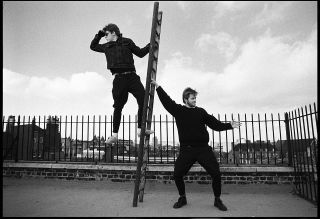
Stiff’s transformation from pub rock to street rock, via the maverick sensibilities of Ian Dury, reached fruition when they signed Madness. Camden Town’s Nutty Boys coincided with a seating in the music industry, as punk’s DIY ethics finally informed the mainstream. Madness enjoyed a straight run of 23 Top 20 hits, and that success allowed Robinson to explore the next medium before compact discs: the pop video.
Despite any unasked-for associations of the National Front and the British Movement with Madness and the so-called Two Tone scene, Stiff shed its reputation as a cottage industry label and made serious money via licensing deals with EMI, Island Records and Trevor Horn’s ZTT, all of which distanced Dave Robinson from his original objectives, ultimately sidelining the label as something whose time was up.
The cheap clocks they’d bought for 50 pence a unit, proclaiming When You Kill Time You Murder Success , seemed rather quaint once Frankie Goes To Hollywood and the whole E-soaked dance movement hit the sprung dance floors of Britain.
Different times also meant different drugs. According to Robinson the momentum had swung back to the majors, who were now adept at swallowing the indie labels that threatened their stranglehold. “We’d missed out on the Police and Dire Straits, which was annoying, but I really wanted to sign the Stray Cats. I’d seen how their psychobilly thing went down with the Madness fans. I went to the Portobello Hotel with a contract, and their singer Brian Setzer agreed to go with us. Unfortunately they’d run up a £40,000 cocaine bill with a record executive, and I wouldn’t undo that debt.
“Everyone was off their heads in the 1980s. I went into one record company one day and the entire staff were off their fucking boxes, in a state of high cocaine tension. I asked a bod what was going on and he told me: ‘There’s your man’. It was [a very famous British movie director]. ‘He’s a runner for the company and he’s a cocaine dealer’.”
Aghast at what he saw, Robinson realised the music business was condemned to repeating a history of mistakes. Having been Jimi Hendrix’s road manager in the late 60s, he’d seen the full cycle. “Hendrix was the most phenomenal talent and person I ever dealt with, but he was also the most stubborn and stupid. When I worked for him he had huge success but no money. I had to find him a flat in London, and I soon realised he knew nothing about his financial affairs. I was banking millions of his money, because I had the briefcase with the receipts in it, into a company in the Bahamas, and yet he was virtually broke.”
Now, a rock generation down the line, Robinson was about to realise that very few lessons had been learned. “Coke was rife, but it was a useless drug; occasionally good at parties. I was very leery about all that stuff. For fuck’s sake, Phil Lynott is buried three graves down from my mother! All that star bullshit! You’ll get burnt to a crisp unless you’ve got strong management. Of all the things at Stiff, I’m proudest of coming up with the slogan: A Star is Somebody Nobody Tells the Truth To.”
Today Dave Robinson thinks Stiff’s legacy could be embodied in a simple home truth: you could be this, or you could be that. Or you could be sensible – and have a lifetime career.
Or, in the words of the sozzled Irish drummer, who witnessed Robinson and Riviera coming close to fisticuffs in a Ladbroke Grove pub one evening in 1976, thus inspiring the little label that changed the music industry forever: if it ain’t stiff, mate, it ain’t worth a fook.
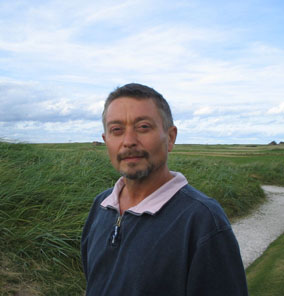
Max Bell worked for the NME during the golden 70s era before running up and down London’s Fleet Street for The Times and all the other hot-metal dailies. A long stint at the Standard and mags like The Face and GQ kept him honest. Later, Record Collector and Classic Rock called.
"We’ve never done a proper, real tour together. Which is nuts, because we’ve toured with everyone!": How Trivium and Bullet For My Valentine have teamed up 2025's biggest metal event
“This happened to us and Layne’s family. If we can be OK with it, why can’t you?”: how Alice In Chains silenced the doubters and rose from tragedy with epic comeback album Black Gives Way To Blue
Orange Goblin announce first album in six years, confirmed as headliners of new UK rock festival
Most Popular
By Jon Weiderhorn 6 April 2024
By Niall Doherty 6 April 2024
By Dannii Leivers 6 April 2024
By Chris Chantler 6 April 2024
By Stephen Hill 6 April 2024
By Dave Ling 6 April 2024
By Mick Wall 6 April 2024
By Rich Hobson 5 April 2024
By Julian Marszalek 5 April 2024
From Butlin’s to Brinsleys: The Life and Times of Stiff Records Co-Founder Dave Robinson (Part 1)
July 2, 2022 • Dave Schulps

By Dave Schulps
I first encountered Dave Robinson’s name in the production credits of two Brinsley Schwarz albums acquired during a visit to United Artists Records’ New York office in late 1972. In the pre-and early- Trouser Press days, Ira Robbins and I would “fortify” our record collections by showing up unannounced (perhaps following a brief phone call to serve as an introduction) at record company headquarters in Manhattan with our handful of published review clips (which was all we had at the time) and hang out in the publicist’s office for maybe an hour, leaving with armfuls of records. (Hard to believe, but there were few label publicists back then who were too busy to patiently host a couple of fledgling rock journos – that would change around the end of that decade).
This particular trip turned out to be a 10 on a 10 scale because:
(1) UA had a great catalog of the kind of British stuff we loved at the time – The Move, Hawkwind, Man and the Brinsleys, whose two 1972 albums, Silver Pistol and Nervous on the Road , I’d already seen reviewed ecstatically in a free Washington, DC arts rag called Unicorn by a guy named Bruce Rosenstein.
(2) The company’s publicist at the time was a former Warhol superstar named Susan Blond, who was (and remains) as nice as can be.
(3) While we were there, she was also visited by two of our rock critic heroes, Richard Meltzer and Nick Tosches, whose mere presence left our mouths agape. (Meltzer, for reasons it didn’t take us too long to figure out, told Susan that the records he wanted to review were whichever were shrink-wrapped and that she needn’t bother him with any that weren’t.)
Robinson, who also managed the Brinsleys, had produced Silver Pistol and Nervous on the Road , which both lived up to Rosenstein’s raves, though like most UA product at the time their U.S. sales would fall somewhere between negligible and pitiful. They would also turn out to be the band’s final U.S. releases: their two subsequent albums , 1973’s Please Don’t Ever Change (produced by the band with Vic Maile) and ‘74s The New Favorites of Brinsley Schwarz (produced by Dave Edmunds and released shortly before the band broke up) only reached our shores as imports.
For those unfamiliar with the Brinsleys, guitarist Brinsley Schwarz and keyboardist Bob Andrews subsequently hooked up with a guy named Graham Parker and became half his backing band, the Rumour; guitarist Ian Gomm eventually got a solo career off the ground, and drummer Billy Rankin quietly left the business. Oh yeah, the bassist and main vocalist was Nick Lowe, who next surfaced as the first artist on Stiff Records, a new British indie label run by none other than Dave Robinson and his partner, former Brinsleys road manager Jake Riviera (né Andrew Jakeman).
In mid-1975 Unicorn critic Bruce Rosenstein wrote a posthumous appreciation of the Brinsleys that appeared in issue 10 of Trouser Press , which gave a bit, but not nearly all, of Dave Robinson’s lengthy backstory (and is a valuable companion to this interview). It also gave us a link to the man himself, which would lead to us reviewing all his new label’s early releases (see Jim Green’s Green Circles column on this site) and snagging what we believe was the first U.S. interview with then highly touted new Stiff artiste Elvis Costello ( TP 24).
So much for background. The Dublin-born Robinson’s career in music, it turns out, goes back nearly a decade before he began trying to push the Brinsleys to fame, and is, in words once spoken by Arte Johnson, “verrrry interesting,” including, as it does, brief (sometimes not so brief) encounters with the Beatles, the just-slightly-post-Them Van Morrison; Ireland’s first psychedelic band (or one of them), the Eire Apparent and the Jimi Hendrix Experience. The man has been around. So, we’re starting from the beginning and just letting this Irishman with a gift for gab tell his own story with minimal interruption. And, yeah, Stiff wasn’t his last project. He’s still at it in 2022. And we’ll get to what that entails following his Stiff exploits in Part 2.
The interview was conducted via Zoom in May 2022.
Your story kind of starts, as all great stories do, at Butlin’s [a chain of large seaside resorts created to provide affordable holidays for British families. There once were ten of them; now only three.]
Dave Robinson: Yeah. That’s a good spot to start any good story.
You went there as a photographer. How did you get from there to Rave magazine?
Butlin’s was amazing for a young man like myself coming from Ireland to the UK. Butlin’s was another dimension. The crowds turned up every week. Most people came for seven days. Lots of guys, lots of girls connected at Butlin’s. And being a beach photographer, I was a kind of what they call a smudger, which is kind of slightly derogatory description.
The Redcoats were the very big hierarchy. They were the people who ran the whole place and wore brown blazers. So I was kind of a brown blazer person. It was very good experience: I had to take the pictures, get their money, and they didn’t get the pictures until the following day. So it was something new. I was about 18.
I didn’t think I was getting this job. I had applied for it four or five months earlier in Ireland and suddenly they said, “Well, can you go to Bognor Regis?”[ Bognor Regis is one of the Butlin’s resorts still in operation. ] I didn’t even know where it was. It was a great three months of experience and some music, a lot of drink and a lot of other photographers.
I got to Rave magazine by networking with the other photographers who came down every year. It was an annual for them and it was very good earning. The harder you worked, the more you got paid. So it was good. [It was] the first time I’d left home, so it was my experience of entry into the UK. Several of the photographers gave me contact numbers in London, which turned out to be photo agencies who then set me up with various interviews, one of which was to Rave magazine. There was also a magazine called Pop [ officially titled Pop Weekly , published from February 1962 ‒ February 1966 ]. And I got jobs which did not involve me in processing the film.
I was sent out to do various jobs and sent the photos to them with some details of who were left to right in the pictures. It was a very important description. Once they sent me to Liverpool to photograph about 12 different groups up there, one of which was the Beatles. And I didn’t make any real connection because the Beatles hadn’t really come out, so to speak, at that stage.
I hadn’t even realized that Rave was a pre-Beatlemania publication. I’d always thought it was sort of mid- to-late-’60s.
Well, Pop was the one who sent me to Liverpool, Rave was the trendy one. When I got to Rave , (a) I got more money and (b) I got a bigger name generally by saying to people “ Rave magazine,” that was a bigger cachet. So Pop was one of the early ones, and there were several. They were kind of in color. They’re mainly black and white, but with the odd color picture. The Liverpool shunt was a two-day event.
What amazed me was that most of the bands were playing essentially the same music. A British take on Louisiana rhythm and blues. I think several people did “Long Tall Sally,” for example. And I wasn’t thinking, “Wow, these are great bands…,” I was just busy getting through my 12 groups and making sure that my left to right was correct because I was told that was what the agency wanted, and if you went wrong there, you went wrong generally.
I remember [meeting] Paul McCartney briefly, because he was friendly. He was friendly and made a bit of an effort, so he stuck in my mind. The rest of them were all fairly Liverpool burly [ difficult ]. To this day, I am still in touch with Paul. I [just got] an E-mail with his name on it.
I started taking a lot of pictures of bands who generally have very little money, never enough to pay the photographer, and I discovered that wide angle lenses were a very key item. I bought a few wide-angle lenses and the groups liked them.
I went back to Ireland having done quite well, made some money, bought a couple of suits and went home essentially to impress my parents that I had a job of some kind and was doing something. While there, I was called by one of the agencies to cover a thing that was happening in Dublin called the Music Medicine Congress. Essentially, it was science and there were all these young doctors. The young American doctors got me to photograph the Ireland country people, and the Ireland country people got me to photograph the Americans. So I was in the midst of it, making good money and taking them to [horse] races in Ireland. After that, I was getting offered quite a bit of work, so rather than go back to London I stayed in Dublin. And I opened the first club there, the first beat club, which I called Sound City. It essentially mirrored all the English clubs that I had been to.
How big a place was it?
About 150 people, though I did manage on one occasion to get 900 into it. So, yes, a lot of condensation and a lot of moisture down the walls.
Alex Harvey came over and he had a profound effect, Herbie Goins and the Night-Timers and that kind of middle-ground English band that would prepare to come to Ireland for quite reasonable rent. But to Dublin, it was a big thing. So I became a bit of a mover and shaker, because I was involved in UK bands. That was my connection to music photography in Dublin.

Rory Gallagher once told me that, when he started, nearly all the Irish bands were what they called show bands.
What were they and did you book them at Sound City?
The show bands were seven-piece bands with a brass section. So they have two or three brass players. They played a big mixture of what was on the charts of the time. Country and Western was very big in Ireland, Jim Reeves-type people, and a bit of soul. The brass section got to do its thing. These gigs were four hours long and they took part in big warehouse-type sheds in the middle of the countryside. The reason they did so well, they were the only opportunity for men and women in Ireland to talk to one another — unmarried, talking to one another. The men were very shy, the women were quite keen, and that is the way that most people in Ireland got together. A lot of people will tell you that their parents met at a show band show. Every town in Ireland had its own show band. So in Cork, you had the Drifters or you had the Royal Showband. There were loads of them. Some were much better than the others, but all of them did four hours work on a Friday and Saturday night.
They didn’t stop; there was no interval. Half of them went to get their dinner in the dressing room while the other half swapped instruments and played different things. There was always a Chuck Berry type. There was always a young guitar player who did the rock and roll numbers and so the rest of them did the country and whatever. It was quite amazing.
I ended up photographing them, too. There was a magazine in Ireland at the time called Spotlight , and I got that gig. So that was my gig to travel to the country. I had long hair, which was unique in Ireland. And so I was an object of some pity and some pointing and hopefully some kind of yearning of young ladies who thought I looked kind of interesting. But all the bands in Ireland were in Spotlight .
It was a very good business because I ended up taking the pictures and giving them prints so they could hand them out to fans and whatever. So it got to be quite a big business. It turned out well.
So you were doing this while you were running the club as well?
Yeah. Well, before the club to a large extent. Once I had the club, I got various young guys to fill in for me. So I actually was employing people to fulfill Spotlight magazine’s criteria — getting them the cover there. There was a band called Larry Cunningham and the Mighty Avons, a very rural show band. Larry Cunningham was a very, very obese gentleman who sang country songs very well. There were huge fan followings for these people because it was the only chance of Irish people to co-mingle. The rest of the time, the parish priest and the Catholic church were very keen to keep them apart.
Those were different times, as somebody once said. I understand Van Morrison showed up at the club one day. Is this post-Them?
Yes. Yes, it is.
So he was already a bit of a celebrity.
I’d taken his picture for some of the earlier magazines. So I knew him as we were both Irish, although I was from the Republic and he was from the North. He was a very quiet guy. He wasn’t into small talk of any nature. He came down after he had fired his manager. He left his manager because he discovered that Philip Solomon, his manager, was taking all his income, some of which was publishing for songwriting, “Gloria” and suchlike, and was paying it to the band as wages. So, in essence, he got upset that the band were running on his money, and he decided to stop it. But Belfast was not a town where you went back when you’d left your manager. So he found it irritating being there and he couldn’t go out, for example, because of his earlier fame. So he came to Dublin and he moved into my flat.
I invited him into my flat. He wanted a manager, and I was kind of toying with the idea, but I really had no experience managing anything except the club. And he would come down and play there from time to time, harmonica mainly, and his ability to lift a local band to greater heights was quite dramatic. When he would get up on stage, the whole band would go from average into something great. But Van ruined my social life, I have told that story a few times. He wasn’t a great flatmate and he had a very odd habit of tapping his cigarette onto his jeans thigh and rubbing it in, for example.
At least it wasn’t your couch.
Well, a lot of it did come off on the couch, particularly where he sat. But [American songwriter-producer] Bert Berns started calling, and Van expected me to deal with Bert Berns. And Bert was very persuasive, but I really had little idea of what a contract would look like. The English ones had been two pages, which covered everything: “We have the right to collect your money from all and every source and do with it as to the betterment of your career.” It was a very general contract, two pages, and all those very early English acts all signed to this kind of paperwork.
Anyway, Bert had recorded “Here Comes the Night” and “Baby Please Don’t Go” [with Them]. And I said to Van, “Look, nothing is happening in Dublin. There is no music business here. You’d have to go back to London, which I’m not an expert in. If the guy has made two big songs for you, why not go get a good lawyer and deal with it properly?” So eventually he decided to go.
I just read that Rob Reiner is doing a bio-pic on Bert.
I’ve been refurbishing my house and I came across The Bert Berns Story on three CDs, and I’m rooting there. I mean, he wrote a lot of songs. And I’m told that he always had a bad heart when he was younger. He had some kind of medical thing. So quite a few of his songs had to do with pain in my heart and various other titles of that kind, which I was told were part of his medical thing.
Anyway, he and Van set off. Van, to give him credit, invited me to go, but I knew that Van wasn’t keen on passengers, and I didn’t fancy being a passenger at the time. Also, I got my flat back and the club was doing very well, so I felt that I would lie back in that particular place. They fell out dramatically, eventually, Van and Bert, and I think his wife felt that Van had given Bert his heart attack, but that’s another story.

How did Eire Apparent come into your life?
Eire Apparent came in through the club. This is a band from Northern Ireland that played in the UK for a while, particularly in the kind of Liverpool, Blackpool area — that was a part of England that had a lot of ballrooms. Henry McCullough was the guitar player, and so from that point of view of fame, one would discuss him a bit. Chris Stewart was the bass player who went on to be big with Frankie Miller and various people of that nature. And Davy Lutton, the drummer was in T-Rex [ also Heavy Jelly, Ellis and the American group Trance Mission ].
Anyway, Eire Apparent were called the People at that time, which seemed like a very anonymous kind of name. It didn’t resonate. But they did very well. They were probably one of the best Irish groups right then. They played a lot of American rhythm and blues, “Mr. Pitiful” and that kind of stuff. America did provide a lot of the groups in the UK with their main cover set. And they were good. So I booked them around the country a bit, but I would have them play every second week or so at Sound City.

At this point, several other clubs sprung up, so there was now a circuit. We had a club people copied, as it happened, and the People made a good living, but there’s a very low ceiling in Ireland. There was a very low ceiling as to where you could get to without going to the UK or America. The show bands were still fairly omnipotent, though. People still went to see the show bands in the country.
And so, I decided to go back into photography. I’d let it lapse a bit, but I remembered the quite decent income I’d had, and I thought maybe being a photographer was going to be my ongoing career. So I went back to London, gave up the club to my two partners, gave up managing the People and set out to make some income and buy back the quite good cameras I’d had, which I’d kind of got rid of. But after I got there, the People showed up.
I don’t know how they found where I lived, but they turned up in a very banged-up Commer van and wanted me to manage them in England. I told them that I really didn’t know anything about the English music scene, but I got three shows for them, one of which was kind of a San Francisco psychedelic party type thing. London was just discovering Haight-Ashbury and that kind of carry-on.
Procol Harum were the lead band that night, along with the Bonzo Dog Doo-Dah Band. The People played at 4:00 in the morning, much to their dismay because everybody was essentially asleep, but they woke everybody up. And a guy at the back of the hall with little round glasses said, “You should talk to me before you talk to anybody else.” And he turned out to be Mike Jeffery, who I discovered much to my amazement was Jimi Hendrix’s manager.
He had clubs in Majorca, an island off the coast of Spain, and needed bands to play, but the Spanish and English were fighting over Gibraltar yet again. And so, Spain — for a bit of leverage — banned all English bands from getting work permits. So he had to get an Irish band, and he’d heard that we were Irish and he’d spent four hours at this gig waiting for us to play. And he said, “You are Irish.” I said, “Yes. Yes, we are.”
What I didn’t tell him, of course, is that we were Northern Irish and all the band had British passports. So I had to rush to Ireland and bend a few ears to get them sudden Irish passports, which they didn’t want. Much to my amazement, they said if anyone in Belfast found out about it, they’d be killed. I said, “Well, don’t tell anybody we’re going to Spain. Don’t tell a soul.”
So that was it. We ended up in Majorca for three months. And I think of it nowadays like the Beatles in Hamburg. We were the People in Majorca, because they were playing three sets a night, three different clubs, and they became very good. They were good and they became better from the constant playing. Chas Chandler, being the partner of Mike Jeffery, looking after the Animals and Jimi Hendrix, came out on holiday and he really liked the group.
[Chas] came down to the show, and said, “These aren’t bad, Dave. We should sign them.” So he and Mike Jeffery decided to sign the People and give me a third of the management. They would do all the main work, and I would be the kind of touring manager. What was delightful about it was the fact that Mike Jeffery’s girlfriend came up with a great idea to call the band the Eire Apparent, as in E-I-R-E. Mike Jeffery thought this was great, and who was I to oppose him at this point?
So, three months in Spain, lovely sun, nice apartment. Unfortunately, I got arrested and ended up in jail. The season was over in Majorca and we were returning to the UK, at which point Chas and Mike Jeffery had booked us into a very nice apartment in the UK and Chas was promising to produce the band and we were looking forward to a music career in the UK. So it was a very big moment, everything big about it. Then Chas called and said, “We’ve got a few early shows for you, Dave, you’ll be supporting Jimi.” And so that was the big one. And the British package tour of that type was every band that got a hit essentially went out on a package tour. There were lots of them. Tito Burns, I think, was the promoter of this particular one. And you had the Jimi Hendrix Experience, 20 minutes, the Pink Floyd, 12-and-a-half minutes, the Nice had 10 minutes and so on. Eire Apparent were second opener, the opener being a cousin of the promoter. We had two songs. The Amen Corner, who already had a big hit, had three. And so that was the setup for a very big and very interesting package tour.
The tour was the very first chance that the Eire Apparent had to get their toe into the water of the actual British music scene. Pink Floyd, of course, hated every moment of it and eventually got their manager to get them a car or a van so they wouldn’t have to mix with the riff-raff who were all on the coach with the Move, who were also on the tour and talking mainly about gonorrhea or venereal warts. That was a very big discussion for Carl Wayne at the time.

It was marvelous fun. Shortly after that, Jimi did a couple of shows for which I was asked to be a roadie, they were short a roadie. Remarkably in those days, people would take on casual staff, roadies. There was no security. There were no criteria for how the whole thing worked. It was all made up on the spot really. So I was introduced to my co-roadie, Lemmy [Kilmister], who didn’t do a great deal of work and spent most of the time just out front talking to the girls. He didn’t change over the years. When Stiff started and we had him doing some Stiff stuff, Lemmy was still the man I remember — great action, very little work. Anyway.
We did the Saville Theater. Jimi did several shows. I think Brian Epstein promoted them and we played a couple of them, once with the Animals, I think once with Jimi. We were really happening now. We felt we were right in the midst of the real thing. Then a terrible blow happened when Chas Chandler said, “Well, guys, I’m afraid you’re now going to have to go and tour America.” So, when you think that the chance of a Haight-Ashbury psychedelic party, where the band had played at four in the morning, had led to this remarkable list of coincidences. Extraordinary.
Our next stop was New York and that was phenomenal. We went out with the Soft Machine who were kind of a very jazz, very odd… The audiences had very little idea what the hell they were doing, really. I think the audience in America thought Jimi was a phenomenon, but at least he was playing a guitar in a provocative manner. The Eire Apparent were Louisiana-influenced, an R&B band and a four piece, and then we had the Soft Machine in between. Robert Wyatt on drums, Mike Ratledge on keyboards, Kevin Ayers on guitar, playing a totally removed series of kind of slightly jazzy, slightly no vocal, kind of music. The audience hung on for Jimi, obviously. It was great that they were there, but the reasons for them, or the kind of music genres they were playing, kind of went over quite a few people’s heads.
Yeah. You were there with Eire Apparent or also with Jimi? Were you tour managing the whole thing?
I got to be. I was just looking after my band, but also helping with the gear. Jimi only had one roadie, so I kind of mucked in, as I had a bit of experience of it, the package tour, etc. I was amazed that there was no template for the tour. There were Marshall cabinets, four 12 inch [speakers] in each one, and the British hadn’t discovered flight cases at this point. So, this gear was on airplanes because the first tour was all by plane. We nearly missed every flight and then the cabinets would come down the chute onto the luggage bin and they all ripped to pieces. It was chaos, absolute chaos.
The tour zigzagged all over America. Because we were traveling by plane, nobody seemed to worry about the sleeping arrangements for the band or the hotels or whatever. Gerry Stickells, who was the tour manager, had got the job in England. He was a friend of Noel Redding, because in the very early stages of the Experience, there was no real income. Chas and Mike Jeffery had very little real income it would seem at the time, so he got the gig because he owned a van. He was actually a scaffolder, and they gave him the gig. He became the tour manager by owning a Commer van, which seemed to be the one that most bands were traveling by. Very good bloke and he went on to be a huge tour logistics guy — Madonna, all the big tours.
He was very highly thought of, unfortunately he’s passed away now. After about a month on the road where we were all settling into touring America with Jimi Hendrix, he had some gallbladder or some kind of medical thing and I think that because of lack of money at the time, he was sent back to England to get it sorted and he was away about six months. I’ve been a month in America and was still an infant of the music business anyway, and America was very foreign territory and I’m given a briefcase and a Beretta and told I’m the tour manager, which seemed extreme. Very extreme. Anyway, I took to it. I’d watched Gerry Stickells and I’d been doing quite a few bits with him and had talked to him. He didn’t know that much more than anybody else, because that was also his first trip in America and it was quite chaotic.
There was a situation in Jackson, Mississippi where, late at night, there was a thundering on the door. I was doing the receipts and I had withdrawn some finance from my briefcase, because I’d been collecting quite large sums of money at shows where you had to do a settlement after the show. Half the income would’ve been paid to the agent in New York and the other half would be in the ticket office after the show. We’d settled into a motel, three bands, the Eire Apparent, Soft Machine, Jimi Hendrix Experience, and about one o’clock in the morning, there’s this thunderous banging on the door and it turns out to be the manager of this small motel and he’s got the police with him.
So I get this very aggressive guy who tells me that he believes there are underage girls on the premises. In this state, Mississippi, it’s 25 years if you were found with a girl — not under 18, I think it was under 21. So he’s very bombastic. I have no idea what to do. The manager of the hotel is kind of signaling with his eyebrows a bit, so I’m kind of thinking there’s something to be sorted out here. The detective was saying, “There’s eight of us here and we’re going to be looking now, going around all the bedrooms and this is serious, so you might want to make some arrangements.” And I’m thinking, “Arrangements?” Then I flash back to my early Irish club days and I said, “Yeah, I’m sure we can sort this out. We’ve been paid cash tonight. I have some facilities, if there’s a way that we can sort this out.”
So it turned out that it cost me, there was eight of them. It cost two grand a man and four for the chief guy and luckily, I had underneath the bed possibly $200,000 or $300,000, that I had taken to do the receipts. I had taken out a quantity, which I’d pushed into my bedside drawer when the knock came on the door and it turned out that was good, because obviously he wanted to see what money I had. Essentially, he took most of what I had, the right kind of amount.
There were no laws like that in the UK. There was an age for girls, but it certainly wasn’t 21, and you certainly didn’t get 25 years if you were caught with one. So, that kind of phenomena was what you got touring in the United States.
Vanilla Fudge were to join the tour for a while, and their manager was from New Jersey. I remember his first name Phillip, but he was a member of quite a tough family in New Jersey. [ According to Wikipedia, Vanilla Fudge was managed by New York club owner Phillip Basile , a reputed member of the Lucchese crime family. ] He came, the gear didn’t arrive. The Vanilla Fudge did not arrive and I was just waiting. I was tour managing and waiting to give the door the nod to open the doors at 7:30, when this guy came up the hall with a very large squat individual beside him. He said, “We’ll need to use the equipment. Our gear hasn’t turned up. I’m the manager of the Vanilla Fudge.” And I said, as you would, I said, “Yeah, I’m sure it’ll be okay, but I’ll have to ask the band. It’s their gear.” As you would in England. The squat guy grabbed the front of my shirt and pulled me down and ripped the shirt down. And when I said, “What, what…” I had a very large pistol in my mouth and I’m saying, “Take whatever, whatever you like.” I’m laughing about it now, but at the time I was absolutely shitting myself. It turned out that in the morning, the manager guy slipped me an envelope with about $2,000 in it saying, “I think I overreacted last night.”
Nice of him.
Yeah. Well, the shirt wasn’t worth that, but it was good. I think at the time I was getting $150 a week. So it was ideal.
The touring was good. Gerry Stickells turned up two months later and it was good. It was the Experience that got me going on the road in America, the Animals, the Young Rascals, and of course, the Chelsea Hotel where all the West Coast bands would stay. Yeah. It was all part of an incredible story.
Were you at Monterey with Jimi?
No, I wasn’t. I had to work in New York rather than go, and it was a big success story. Everyone felt that this was the big door-opener that it was. After that, I was on the road with him for nearly 19, 20 months.
Were you at Woodstock?
No. Again, I was a logistics man and Jeffery ran the office and you got to go to gigs when you were allowed. So, no. Woodstock wasn’t a big thing though. We talk about it now as something really extraordinary, but at the time it was, like, a helicopter ride. It was a hassle. It was felt to be a hassle to go to this gig and nobody realized the size or the influence of it at the time.
I went with my summer camp.
Did you? How’d that happen?
As soon as the parents began to get wind of what was going on, we were outta there – released from Woodstock after the first day.
How many people with you?
Oh, probably a hundred or so.
It must have been extraordinary.
It was that.
Henry McCullough, who’d been in the Eire Apparent, had got busted in Canada for marijuana. He was pretty much told by the lawyers that he would do time. They wanted to get some big-name musicians and they didn’t actually get Hendrix, so getting him was going to be a big thing and he would do time. He was advised by Mike Jeffrey and Company to go back to England and skip bail. He was at Woodstock in the Grease Band behind Joe Cocker.
Janis Joplin was around. She really fancied Henry and gave him a lot of grief. And Jim Morrison was around. The Scene club in New York was the place to be, if not the Whisky in LA, and the band was starting to do things like six months in each town and tour out of the town, but be back for the evening shows. So a lot was going on. Electric Lady [ Hendrix’s New York recording studio ] was starting to be built. And Jimi produced Eire Apparent’s first album — not with Henry, Henry had left — but I think that’s the only album Jimi actually produced. He wanted to do it, and I was more than happy.
I’m sure. So after Jimi passed and that kind of went away, you go back to England and we’re at the start of the ’70s. Hippie is maybe starting to wane a little bit and then you get heavy into management there with Famepushers. Who were your partners Eddie Moulton and Steve Warwick?
Well, I came back with the Eire Apparent, but after the fame of America and the fact that there was nothing really big about them in the UK, they gradually tailed off. They started to fight and eventually split up. So, I’m kind of on my own out there with a great story to tell, but not a huge amount of anything else worthwhile. Steven Warwick was a film editor by and large. He was a friend of a girlfriend that I had at the time and he had met this guy, Eddie Moulton. So Steven Warwick said to me, “You’ve had experience Dave, this guy wants to start a management company, and he’s got some income. Would you be interested?” And, of course, I was.
Eddie was a very flaky individual. It turned out that Eddie Moulton wasn’t his name at all. I had several meetings with him. He had no idea how it worked, but he had several other companies that did various things. He had started a lot of companies and it turned out he was moving pretty much the same funds through all the companies. So he told me that he had £5,000 and I said, “Well, that’s not going to go very far, Eddie.” You know, we could maybe find a band, maybe get a few gigs, but that’s not management funding. We’d have to try record deals and all the other things. It’ll last us two or three months. We might find a group.
So I decided we might as well use it as this all is happening. I put an ad in the Melody Maker for a group with own equipment and van, which about 70 bands answered. The best of a bad lot, really, is how I described them, was a group called Kippington Lodge. What was good about them is they had a bass player called Nick Lowe and a guitar player called Brinsley Schwarz. It turned out that they didn’t have their own equipment or their own van. They lied to me. I got [them] a few gigs. Getting an agent was one of the real problems. The agent had a lot to do. [ The band soon shed the name Kippington Lodge in favor of their guitarist’s more memorable name. ]
Frank Barsalona [ founder of Premier Talent, a groundbreaking booking agency ] was a very key part of an awful lot that was happening on the East Coast of America. In England, if you hadn’t got a record deal, you couldn’t get an agent. And if you didn’t have an agent, you couldn’t get a record deal. In order to try and get an agent and to do something with this £5,000 that Eddie had, that was disappearing over the hill very quickly, I came up with the idea of putting the band on in New York at the Fillmore East. It was a very late-night kind of idea and plan.
I got Bill Graham to agree by flying to San Francisco, having spoken to him on the phone, I got on a plane immediately after, and I was in his office in the morning. He said, “What? You’ve just come from the UK?” I said, “Yeah.” He said, “Well, I’ll look at my calendar.” So we got a gig with Van Morrison and Quicksilver Messenger Service.
Your friendship with Van didn’t have anything to do with that?
No, but what it did do is when Bill Graham wanted, because the plane was late getting to New York with the 150 journalists, the people that we had got to go and see the band. One of the charter planes had landed in foam in Shannon [Ireland] airport because the hydraulics had gone out over the UK. Aer Lingus opened a bar for them.

So they were splashed. The whole lot of them were too out of it by the time they got New York, because they’d been delayed four hours in the middle, in chaos. The band also were denied work permits by the U.S. embassy. I took them to Canada thinking I might be able to slip over the border, which turned out to be the only way we were getting anywhere.
Eventually I did get visas for them, but it was a bit late. So the Fillmore East, Bill Graham is a notorious timekeeper and our plane has just landed and we’re never going to get the opening slot. And I said, “Van, I really need a big favor here. You’re the only one who can do it. Bill Graham thinks you’re God. So can you delay things? Can you see if we can delay things?” So he did. He did put the word in and we got it. We got an execution delay. So the band, needless to say, didn’t play that great, given the pressure of it, all. The lead guitar player…
Was part of that because Brinsley had gone deaf?
Yeah. Brinsley was completely deaf. He’d never been in a small airplane and we knew that’s the only way we’d get over the border at Buffalo. So he could only see where he was [during the set] by looking at Nick Lowe’s hands. He couldn’t actually hear anything. Out of 150 journalists we brought, I think about 15 people actually got to the gig. Everyone else decided to go to a club, to go to a hotel, to throw off. Three of the limos that were taking them to the gig crashed. It was all those kind of things.
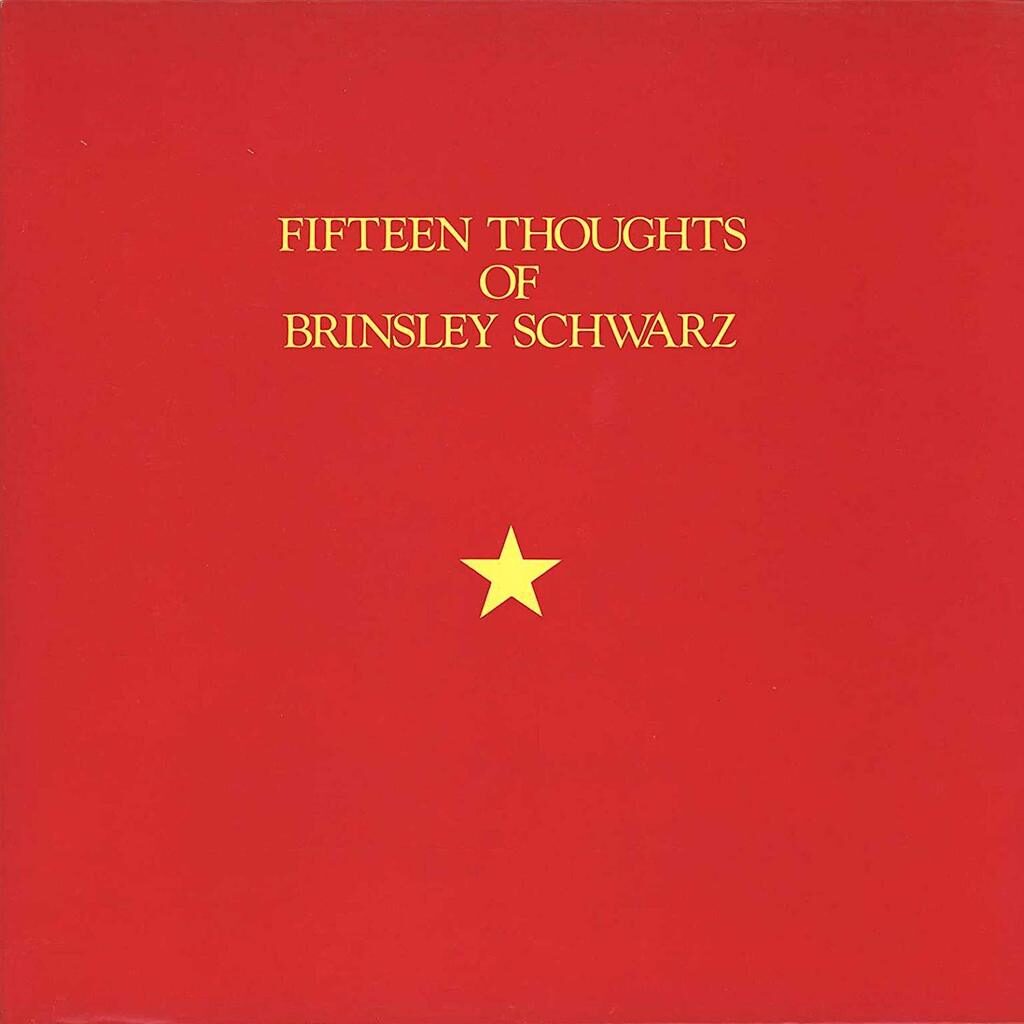
And we got column inches in England — everyone decided they were going to knock the whole thing. So we had a terrible time. And yet United Artists decided to give us a three-album deal on the basis of the story and how it looked and a few Jimi Hendrix sprinkled stories from me and we also got a publishing deal. So we raised quite a bit of money even though the band had a disaster press-wise. The record didn’t do too well, but we had a new lease on life.
How did Dave Robinson become a record producer?
Well, I had been in the studio with Jimi. I’d picked up quite a bit without particularly knowing that much about it. The actual production, at least. I knew the engineering element because I was quite good in that department. With the £5,000 we had that was becoming very small, I had to do what I could. I got Olympic Studios to give us some credit because I knew the girl who ran it. I thought, “How difficult can this be?” It’s been one of the problems of my life saying something like that, “How difficult can this be?” And we went in to do some demos because we needed to get a record company interested to find the elusive agent because that was the reason for the trip to New York.
And so it seemed good. The engineers did a lot of work. The band had some good-ish songs. They were very influenced by Crosby, Stills, and Nash at the time. I started then. I’ve made probably 40 albums in my career now and they were all based around what I learned at Olympic Studios at that time really. Stiff, who didn’t have a very big budget, had a very simple, similar pretension.
So, the Brinsleys came back, moved into a big commune all together, because it was cheaper that way, and proceeded to set up a pub rock kind of situation around the country. They got away from the prog rock, the long drawn-out songs, and got into the short dynamic ones and became quite famous for an entirely different kind of music during ’70 to ’74.
I started a studio. I always wanted to discover how to be a producer, so I thought, I’ll build a studio and that will help me. Remarkably, Brinsley Schwarz got a support slot with Wings. That was one of the heights of the thing. And Paul McCartney was very influential in getting them the slot.
So Henry [ McCulloch, remember him? We left him with the Grease Band at Woodstock ] had joined Wings and that gave me entrée to Paul. Paul decided he’d take the group on as a support band, and it was again a phenomenon. What happened though, was the group didn’t seem to see it as the big thing that I did.

I thought it was a great learning curve. I thought McCartney knew more about it than anybody else you could possibly talk to. They weren’t too impressed. They were in the pub a lot of the time. They were a bit jaded, maybe, after four years of being Brinsley Schwarz, and so I said, “It’s ridiculous. Here we have a big door-opening break that we can use, and you’re learning from the key man I always thought you’d learn from, and you’re not interested. As far as I’m concerned, I want to do a studio, so I’m going to pack it in with you. So I started a studio at the Hope and Anchor, which was a small pub, very similar to Sound City. You know, one goes around all the time. (One night the landlord and myself had got a bit wound up and we knocked down the pillars in the Hope and Anchor. They were big arch pillars for a beer cellar and we knocked them out one night. Every time I go to that pub, I look at the ceiling, because we never told anybody.)
So I booked for the next two years at the Hope and Anchor all the bands in London, one of which was Flip City with a lead singer called Declan MacManus. Ian Dury played there, not Wreckless Eric, but a lot of the bands played that pub circuit and I eventually signed all of them to Stiff. And they became the warriors of the independents-against-the-major-record-companies period, which Trouser Press was there for from America through that whole period.
Yeah, you actually anticipated my next question, because I was wondering if you and Jake Riviera were taking some cues about indies from Trouser Press and New York Rocker .

Stay tuned for Part 2, in which Dave Robinson recalls the Stiff years and introduces his current project , Hardwicke Circus.
Leave a Reply Cancel reply
You must be logged in to post a comment.
- Wed. Apr 10th, 2024

The Petri Dish
Where the culture grows - Music venue, Art, Educational & Cultural Community Centre
Dave Robinson (Stiff Records) – One Man Show
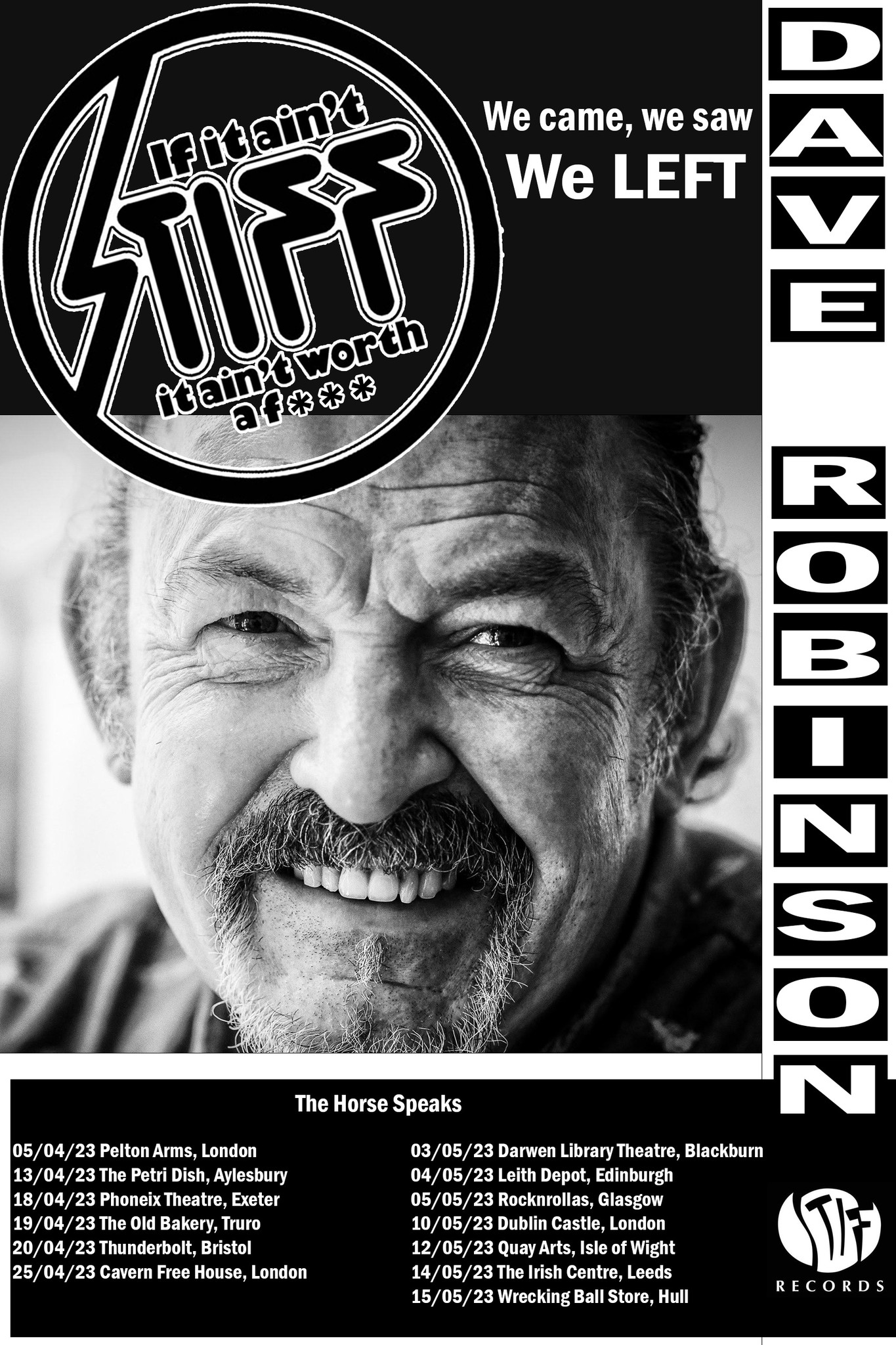
An evening with Dave Robinson
– co founder of stiff records, tour manager for jimi hendrix –, bringing his stunning one man talk show to the petri dish., “if it ain’t stiff… it ain’t worth a f@#”.
Book your tickets via email
ON THE DOOR
Please bear in mind we are able to accept and confirm bookings till the previous midnight.
ON THE DAY (13th of April) EVERY TICKETS ARE ON THE DOOR PRICE.
We are thankful for your support and understanding!
- Contact Details
- Organizer Name: The Petri Dish
- Phone: 01296394720
- Email: [email protected]
- Type: Nightout,Performance
- Time: 13 April 2023 - 7:30 pm - 11:00 pm
- Venue: The Petri Dish
Leave a Reply Cancel reply
Your email address will not be published. Required fields are marked *
Save my name, email, and website in this browser for the next time I comment.
Events / Activities
What’s your passion, don’t miss out, rockin’ the dish, affordable live music in 2023, subscribe to our newsletter.
An evening with Dave Robinson (Stiff Records Tour)
Thu May 04 2023 at 07:30 pm to 10:30 pm
Leith Depot | Edinburgh, SC
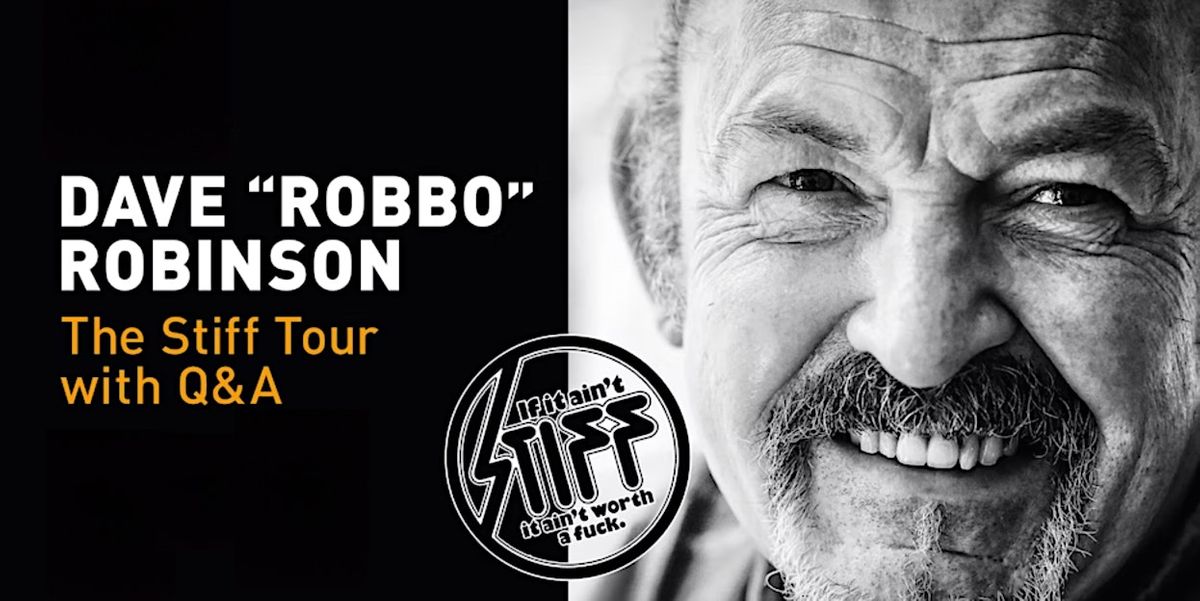
The Damned, Madness, The Pogues, Elvis Costello, Ian Dury, Devo, Tracey Ullman, Nick Lowe, Wreckless Eric, The Belle Stars, Kirsty MacColl, Jona Lewie....... Dave "Robbo" Robinson signed them all.
There are only a handful of A&R guys ever who've had so many hits.
Stiff Records was legendary for its kicking against the pricks, anti music biz attitude. As they said, "If It Ain't Stiff It Ain't Worth a F**K", and that in 1979!
Robbo oversaw the signings, the videos and the marketing, vans really were thrown out of the back of planes, artists were left gibbering wrecks!
Come down to Leith Depot on May 4th to hear Robbo tell stories of the Stiff days complete with video footage of those incredible acts. Dave will be taking questions from the audience, a great chance for you to listen back to some of the best British pop records ever made.
Robbo is one of THE characters from the hey day of the British music business. Sadly there aren't many left in today's bland corporate music world, so come and listen to some fabulous tales from a time when the music business was Fun with a capital F!
DAVE ROBINSON BIO
Originally a teenage photographer in Dublin, Dave Robinson opened the first Beat Club in Ireland. He took pictures for Rave magazine at the Cavern with the Beatles and on the Rolling Stones first tour of Ireland ; He befriended Van Morrison, and briefly managed him, and he was Jimi Hendrix’s Road and Tour manager from his first tour of the UK with the Pink Floyd, The Nice and The Move.
He shared flats with Jimi and Noel Reading in London and toured with The Experience across America and the world until just before Jimi’s death. He also did major tours in the US with Eric Burden & The Animals, The Young Rascals and the Vanilla Fudge. He partied and clubbed with The Grateful Dead, Janice Joplin, The Who, Jim Morrison and the Doors. He then returned to London and started and managed Brinsley Schwartz, Graham Parker, Nick Lowe, Dave Edmonds, Ian Dury and Elvis Costello.
In London, he single-handedly created a network of 35 pubs where bands could play what they liked, and this became the forerunner of punk. Dave built a recording studio above the legendary Hope and Anchor Pub in Islington and with Jake Riviera, he started Stiff Records and signed The Damned, Motorhead, Elvis Costello, Nick Lowe, Tracey Ullman, The Plasmatics, Jona Lewie, Ian Dury & The Blockheads, Kirsty McColl, The Box Tops, The Adverts, Lene Lovich, Shane McGowan &The Pogues, Madness and many more.
As well as running Stiff, Dave was installed by Chris Blackwell as president of Island Records, where he oversaw the careers of U2, Robert Palmer, Stevie Winwood, & Frankie Goes to Hollywood. He personally compiled and marketed Bob Marley’s 40 million selling LEGEND album. The biggest reggae album in the World.
He represented Rick Rubin running Def Jam Records and American Recordings outside North America working with Johnny Cash, the Black Crows, Slayer, Danzig and the Jayhawks. He settled the vicious two year litigation between Rick Rubin and Roger Ames, Chairman of PolyGram and signed American Recordings to BMG.
Dave then ran The Famous Blue Note Club and Acid Jazz Label in London helping to launch the Drum and Bass dance movement.
Dave has been at the helm or in the mix of the most exciting and important musical developments and he is still active in the music industry as a consultant for various labels and projects - from Van Morrison for EMI to the Gregory Isaacs for Universal, as well as keeping an eye on some of the most enduring repertoire the music industry has even seen.
DOORS : 7:30PM
OVER 18'S ONLY
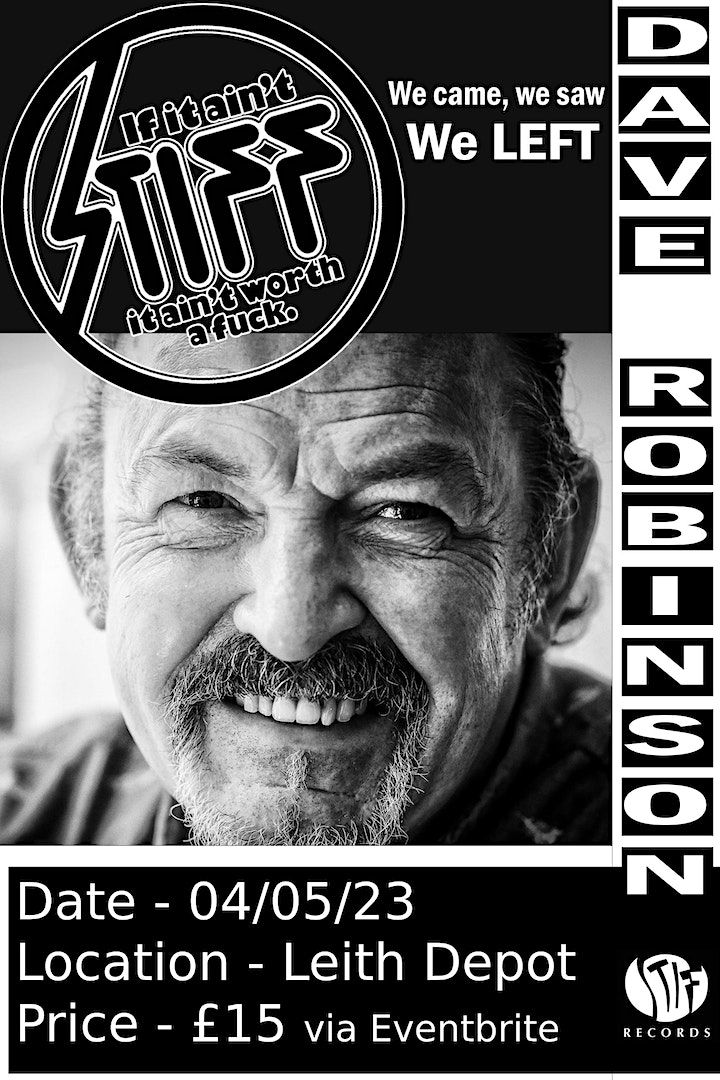
Where is it happening?
Event Location & Nearby Stays:
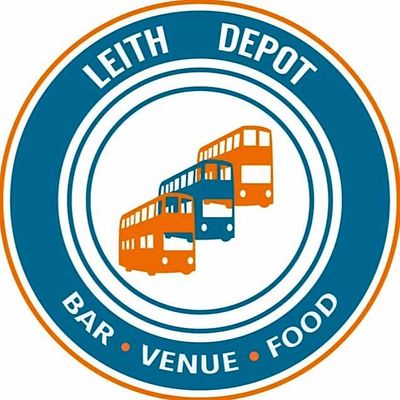
Host or Publisher Leith Depot
It's more fun with friends. share with friends.
Dave Robinson - 'The Stiff Story' Live On Tour
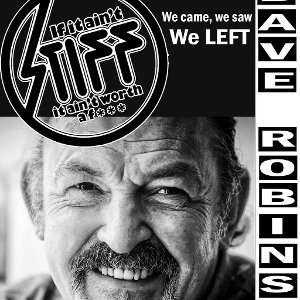
If It Ain't Stiff …. It Ain't Worth A F@#!. The Irrepressible Co-Founder Ofstiff Records Is Visiting A Town Near You With More Anecdotes, Great Music & Stories. He Managed Van Morrison, Tour Managed Jimi Hendrix, Eric Burden & The Animals And More. He Partied With The Grateful Dead, Janice Joplin, The Who, Jim Morrison And The Doors. And Signed To Stiff Records Brinsley Schwartz, Graham Parker, Nick Lowe, Dave Edmonds, Elvis Costello, The Damned, Motorhead, Tracey Ullman, Ian Dury & The Blockheads, Kirsty Mccoll, The Pogues, Madness Amazing!
Text supplied by third party.
Performance times
We have no details of upcoming performances, if you do please let us know .
Similar events
Holy Youth Movement Fresh from supporting Primal Scream, Holy Youth Movement head over to Liverpool for the first…
A Spectacular Night of Queen A Spectacular Night of Queen takes you back in time to when Queen ruled the airwaves! The…
Riffolution Festival 2023 The time has now finally come to share with you our the first batch of bands on Riffolution…
Supersonic Queen Join us at Dalkeith Miners Club as we host the UKs Best tribute to the one and only QUEEN!
Noel Gallagher (Oasis + NGHFB) Tribute *CAMBRIDGE* Noel Gallagher's High Flying Carpets are back @ The Six Six Bar in Cambridge! The UK's biggest…
Not The Rolling Stones Capturing the authentic sound and spirit of The Greatest Rock n Roll Band In The World, Not The…
Candid - Intimate Release Party Hailing from Coventry; indie outfit CANDID (Rob, Dan, Sam and Max) have been turning heads with…
London Music Presents: Smoking Ocean Something is happening… The best way I can describe it is like one member said to me: ‘Tim - It’s…
- Rock & roll

Interested in music events data?
Access the UK's leading set of live events information with Data Thistle
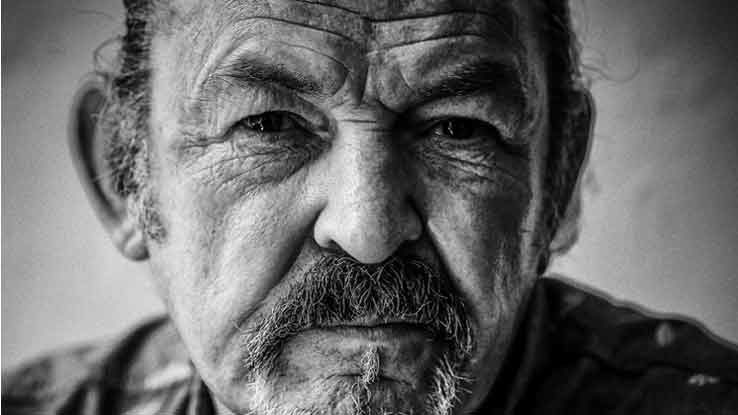
Jenny Quinlan / February 5, 2020
Dave Robinson – The Stiff Records Story.
An evening of anecdotes and music with Dave Robinson who brings The Stiff Records story to Liberty Hall.
Find Tickets
Dave Robinson brings The Stiff Records story to Liberty Hall Theatre on Saturday 29 February 2020.
As a teenager Dave was a photographer in Dublin and helped to open the first Beat Club in Ireland, Sound City . Taking pictures for Rave Magazine at The Cavern with The Beatles, and on The Rolling Stones first tour of Ireland, he befriended Van Morrison , and briefly managed him.
He has toured with Jimi Hendrix , The Experience , Eric Burden & The Animals , The Young Rascals and Vanilla Fudge and partied with The Grateful Dead , Janis Joplin , The Who , Jim Morrison and the Doors .
He then returned to London and started managing bands like Brinsley Schwartz , Graham Parker , Nick Lowe , Dave Edmonds , Ian Dury and Elvis Costello .
Dave created a network of 35 pubs where bands could play what they wanted and this became the forerunner of punk. He built a recording studio above the legendary Hope and Anchor Pub in Islington and, with Jake Riviera, he started Stiff Records . They signed The Damned , Motorhead , Elvis Costello , Nick Lowe , Tracey Ullman , The Plasmatics , Jona Lewie , Ian Dury & The Blockheads , Kirsty McColl , The Box Tops , The Adverts , Lene Lovich , The Pogues , Madness and many more.
After Stiff Records, Dave became president of Island Records , where he oversaw the careers of famous names such as U2 , Robert Palmer , Stevie Winwood , & Frankie Goes to Hollywood . He personally compiled and marketed Bob Marley ’s 44 million selling LEGEND album. The biggest selling reggae album of all time.
He represented Rick Rubin running Def Jam Records and American Recordings outside North America working with Johnny Cash , the Black Crows , Slayer , Danzig and the Jayhawks . He settled the vicious two-year litigation between Rick Rubin and Roger Ames, Chairman of PolyGram and signed American Recordings to BMG. Dave then ran The Famous Blue Note Club and Acid Jazz Label in London helping to launch the Drum and Bass dance movement.
Dave has been at the helm or in the mix of the most exciting and important musical developments and he is still active in the music industry as a consultant for various labels and projects – from Van Morrison for EMI to The Dubliners & Paul Carrack .- as well as keeping an eye on some of the most enduring repertoire the music industry has even seen.
Related News

We’re Hiring: Do you want to join the Ticketmaster team?
Ticketmaster
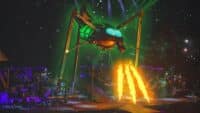
Jeff Wayne on the story behind ‘The Eve Of The War’
Stefan Pape

Great events happening this Easter
- Listen Local
- Entertainment

all that made us punk girls …. and still does
- View your shopping cart £0.00 0 items
Be Stiff Tour – The Age of The Train

Well, at least that’s how it had always worked in the past.
Enter the management and bands of Stiff Records, who were never much for doing anything by the book.
Stiff were the slightly more eccentric side of the punk records family, probably the first truly maverick of the early Independent labels; with a scratch and sniff release, their “ain’t worth a f*ck” slogans, and their “mixed” roster of bands. In October 1978, five of Stiff’s then current recording artists embarked on the second Stiff Records tour of the UK, not in a transit van or tour-bus, but even more remarkably, on a train.

Head honcho Dave Robinson seemed to have made the tour transport decision purely based on his own love of railways and their aesthetics above any practical reasons, “We knew we had to make it special, and I loved those old trains with the first-class carriages that had the little compartments, so we hired one”.

So, at the beginning of October 1978 Wreckless Eric, Lene Lovich, Jona Lewie, Rachel Sweet and Mickey Jupp made their way to the platform at Kensington Olympia station in West London to begin their month of UK, Rock and Roll inter-railing. Amazingly, film footage from that day still survives, from what we think might be an OGWT or news report (any ideas?), with commentary by the lovely Annie Nightingale, and including the tour anthem “Be Stiff” by Devo.

“The train tour was typical Stiff,” admits Robinson, “We liked to have fun and we liked to keep our bands busy. ‘A Tired Band Is A Happy Band’ – that was our motto”.
There are some great photos taken on the train by music photographer Adrian Boot including snaps of Lene and Rachel playing cards on one of the tables, which you can see HERE .

Coming at the story from rather a different angle, train enthusiast website RMWeb , notes the following:
“The train was stabled overnight at Ramsgate and departed there at 12.36 the following day for Guildford via Canterbury West, Ashford, Orpington, Brixton, Clapham Junction(W) and East Putney, hauled by 33056(HG). The train was formed of an unidentified Motorail flat, S38744, S38745, E321E, E13306, E14050, ADM44404.”
The Be Stiff 1978 train tour can be seen as yet further proof, if any were needed, that the Punk movement and the people behind the Independent record labels that came with it, continued to rip up the rule book as far as ye olde tried and tested methods were concerned, and maybe more importantly, not forgetting to add some fun in along the way.
Share this:
1 thought on “ be stiff tour – the age of the train ”.
This was a brilliant tour! I just found out abut the “Be Stiff Tour” promo EP with all of the version’s of DEVO’s “Be Stiff.” I only have the Rachel Sweet and Lene Lovich versions already but need all of the others! I thought it was genius of Stiff to ask their talent to cover this song even if only the title was the same of some of them.
Tell us what you think! Did you like the post? Do you agree? Do you have some information or experience to share? Please let us know by commenting! Cancel reply
Discover more from.
Subscribe now to keep reading and get access to the full archive.
Type your email…
Continue reading
An evening with Dave Robinson (Stiff Records Tour)
Thu may 04 2023 at 07:30 pm to 10:30 pm, leith depot | edinburgh.

The Damned, Madness, The Pogues, Elvis Costello, Ian Dury, Devo, Tracey Ullman, Nick Lowe, Wreckless Eric, The Belle Stars, Kirsty MacColl, Jona Lewie....... Dave "Robbo" Robinson signed them all.
There are only a handful of A&R guys ever who've had so many hits.
Stiff Records was legendary for its kicking against the pricks, anti music biz attitude. As they said, "If It Ain't Stiff It Ain't Worth a F**K", and that in 1979!
Robbo oversaw the signings, the videos and the marketing, vans really were thrown out of the back of planes, artists were left gibbering wrecks!
Come down to Leith Depot on May 4th to hear Robbo tell stories of the Stiff days complete with video footage of those incredible acts. Dave will be taking questions from the audience, a great chance for you to listen back to some of the best British pop records ever made.
Robbo is one of THE characters from the hey day of the British music business. Sadly there aren't many left in today's bland corporate music world, so come and listen to some fabulous tales from a time when the music business was Fun with a capital F!
DAVE ROBINSON BIO
Originally a teenage photographer in Dublin, Dave Robinson opened the first Beat Club in Ireland. He took pictures for Rave magazine at the Cavern with the Beatles and on the Rolling Stones first tour of Ireland ; He befriended Van Morrison, and briefly managed him, and he was Jimi Hendrix’s Road and Tour manager from his first tour of the UK with the Pink Floyd, The Nice and The Move.
He shared flats with Jimi and Noel Reading in London and toured with The Experience across America and the world until just before Jimi’s death. He also did major tours in the US with Eric Burden & The Animals, The Young Rascals and the Vanilla Fudge. He partied and clubbed with The Grateful Dead, Janice Joplin, The Who, Jim Morrison and the Doors. He then returned to London and started and managed Brinsley Schwartz, Graham Parker, Nick Lowe, Dave Edmonds, Ian Dury and Elvis Costello.
In London, he single-handedly created a network of 35 pubs where bands could play what they liked, and this became the forerunner of punk. Dave built a recording studio above the legendary Hope and Anchor Pub in Islington and with Jake Riviera, he started Stiff Records and signed The Damned, Motorhead, Elvis Costello, Nick Lowe, Tracey Ullman, The Plasmatics, Jona Lewie, Ian Dury & The Blockheads, Kirsty McColl, The Box Tops, The Adverts, Lene Lovich, Shane McGowan &The Pogues, Madness and many more.
As well as running Stiff, Dave was installed by Chris Blackwell as president of Island Records, where he oversaw the careers of U2, Robert Palmer, Stevie Winwood, & Frankie Goes to Hollywood. He personally compiled and marketed Bob Marley’s 40 million selling LEGEND album. The biggest reggae album in the World.
He represented Rick Rubin running Def Jam Records and American Recordings outside North America working with Johnny Cash, the Black Crows, Slayer, Danzig and the Jayhawks. He settled the vicious two year litigation between Rick Rubin and Roger Ames, Chairman of PolyGram and signed American Recordings to BMG.
Dave then ran The Famous Blue Note Club and Acid Jazz Label in London helping to launch the Drum and Bass dance movement.
Dave has been at the helm or in the mix of the most exciting and important musical developments and he is still active in the music industry as a consultant for various labels and projects - from Van Morrison for EMI to the Gregory Isaacs for Universal, as well as keeping an eye on some of the most enduring repertoire the music industry has even seen.
DOORS : 7:30PM
OVER 18'S ONLY

Event Venue & Nearby Stays
Leith Depot, 140 Leith Walk, Edinburgh, United Kingdom
Discover more events by tags:
Sharing is caring:.
GO AD-FREE. Get 2 Months Digital Subscription for ONLY £1! Use code 2FOR1
- Public Notices
More on KentOnline
- Family Notices
- Kent Travel news
News you can trust
13°C | 1°C
5 day forecast
- What's On news
- Secret Drinker
- Eat My Words
- Events calendar
- Submit an event
- Food and Drink
- Newsletters
Find local news
Your local news for kent.
- Romney Marsh
- Isle of Sheppey
- Sittingbourne
- Tunbridge Wells
Latest news
Key commuter route closed after accident, lioness inspires new girls’ football team, ‘i’ve worked the same job for 60 years since i left school and i’m not retiring anytime soon’.
- Kent Travel News
Home What's On News Article
Stiff Records founder Dave Robinson brings his one man show to Folkestone

Founder of Stiff Records Dave Robinson's life reads like a who's who of the music industry from back in the day.
The music legend, who brings his one-man show to Folkestone this week, started out as a photographer in his teens in Dublin, opened the first Beat Club in Ireland, took pictures for Rave magazine at the Cavern with The Beatles, and went on the Rolling Stones' first tour of Ireland.
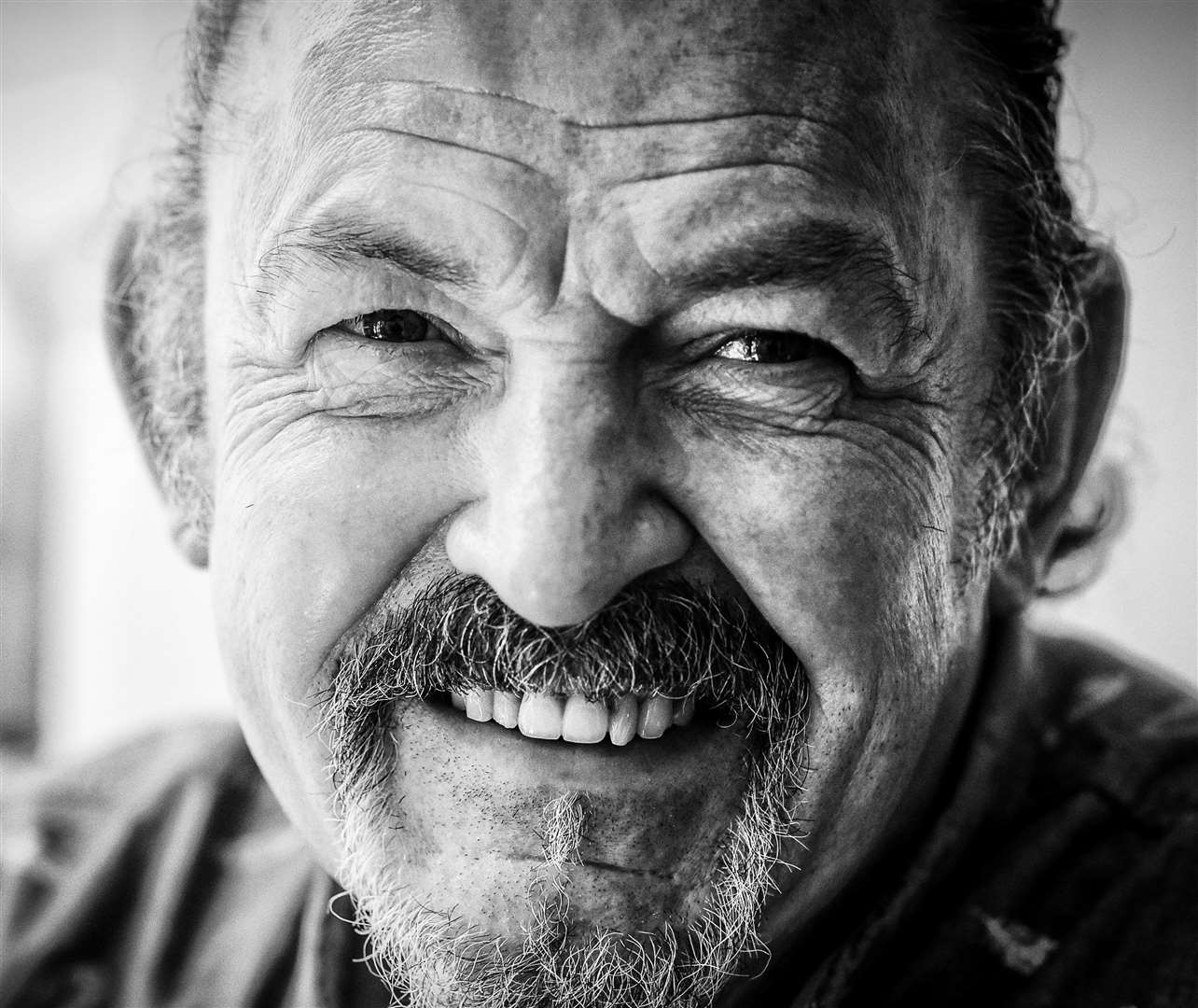
A friend of Van Morrison's, he was Jimi Hendrix’s road and tour manager for his first UK tour with Pink Floyd - even sharing flats with Jimi and Noel Reading in London and touring with The Experience across America.
He partied and clubbed with the likes of The Grateful Dead, Janice Joplin, The Who, Jim Morrison and the Doors and later managed Ian Dury and Elvis Costello.
In London, he single-handedly created a network of 35 pubs where bands could play what they liked, which became the forerunner of punk.
After building his own recording studio above the legendary Hope and Anchor Pub in Islington, with Jake Riviera he started Stiff Records which signed music names that are now the stuff of legend, from The Damned, Motorhead, Elvis Costello and Ian Dury & The Blockheads to Kirsty McColl, The Pogues and Madness.
Life since the label has been no less busy, as president of Island Records, overseeing the careers of U2, Robert Palmer and Frankie Goes to Hollywood, compiling and marketing Bob Marley’s Legend album, and still involved in music today.
A true raconteur, there's a rare chance to hear about the people, the parties, the madness and more with his one-man show, named after a familiar slogan to all those who owned a Stiff Records album or single decades ago.
Ahead of the show, we asked him to pick his top five Stiff Records singles:
1. Alison - Elvis Costello
A really wonderful song from Elvis Costello taken from his debut album on Stiff Records and was recorded before Elvis Costello and the Attractions formed. The backing band on Alison was American group Clover. Elvis is still touring to this day.
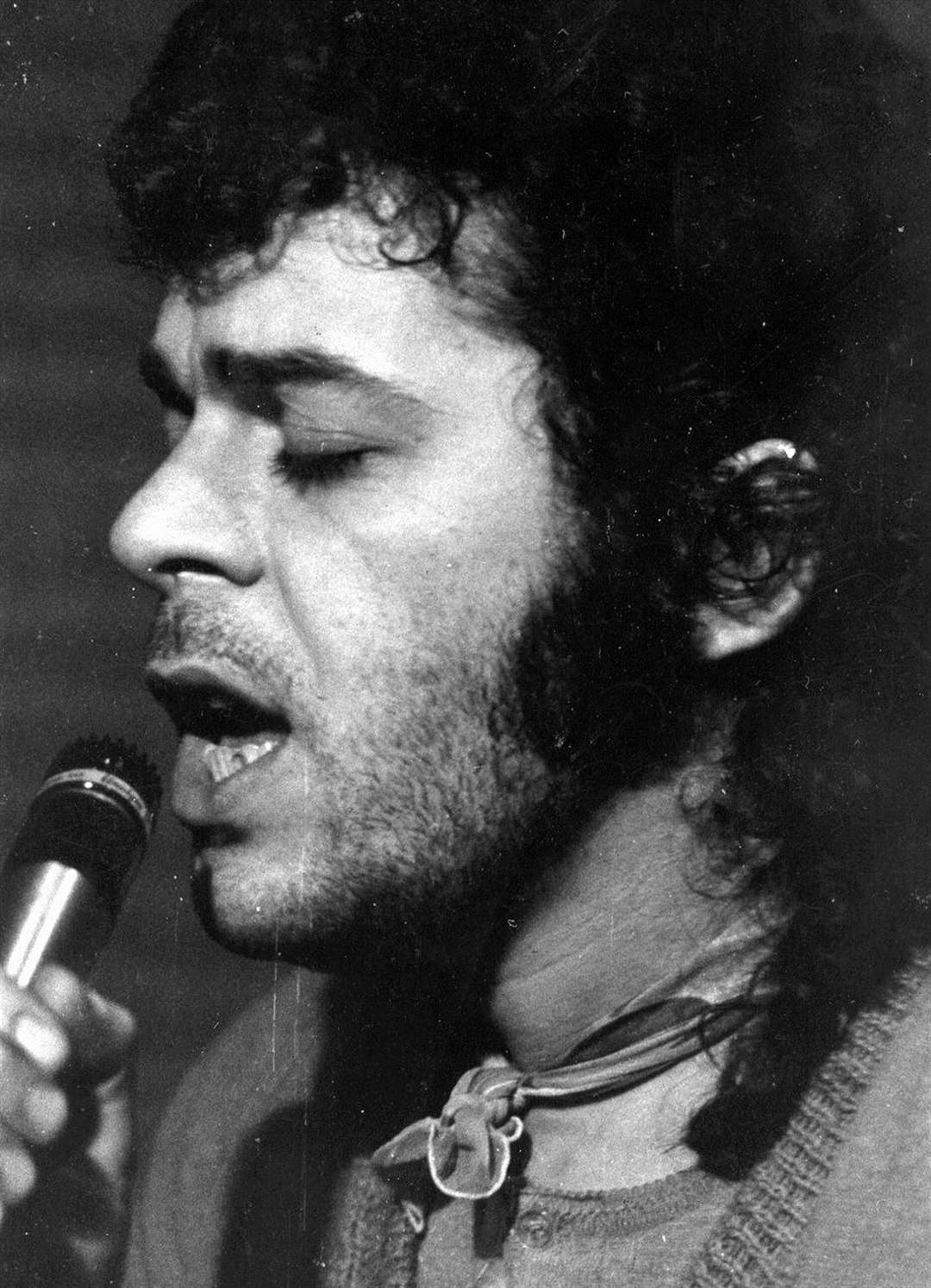
2. Hit me with your Rhythm Stick - Ian Dury
Stiff's first No.1 and really a very unlikely track to get radio play, but it did and it went to No.1. Unfortunately Ian passed over to the great R & R tour in the sky in 2000, but what a great wordsmith & poet he was.
3. You'll always find me in the Kitchen at Parties - Jona Lewie
A great sentiment indeed about the guy who was too shy to mix with the crowd and was a bit of a loner, but sung here to a great rhythm. Jona is still treading the boards.
4. My Girl - Madness
What can you say about the nation's darlings? They go from strength to strength and are also still touring - we taught them well!
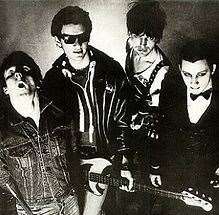
5. New Rose - The Damned
The very first punk rock band to release a single in the UK and I think this is still a great garage rock song. The Damned are going strong and possibly bigger than ever.
Dave Robinson is at HUSH upstairs at The Eleto Chocolate Cafe at 12-14 Rendezvous Street, Folkestone, on Friday, October 18. Doors open at 7.30pm, for 8pm. For tickets at £14 go to wegottickets.com or call 01303 311707.
To find out what’s going on in the county and for all the latest entertainment news click here.
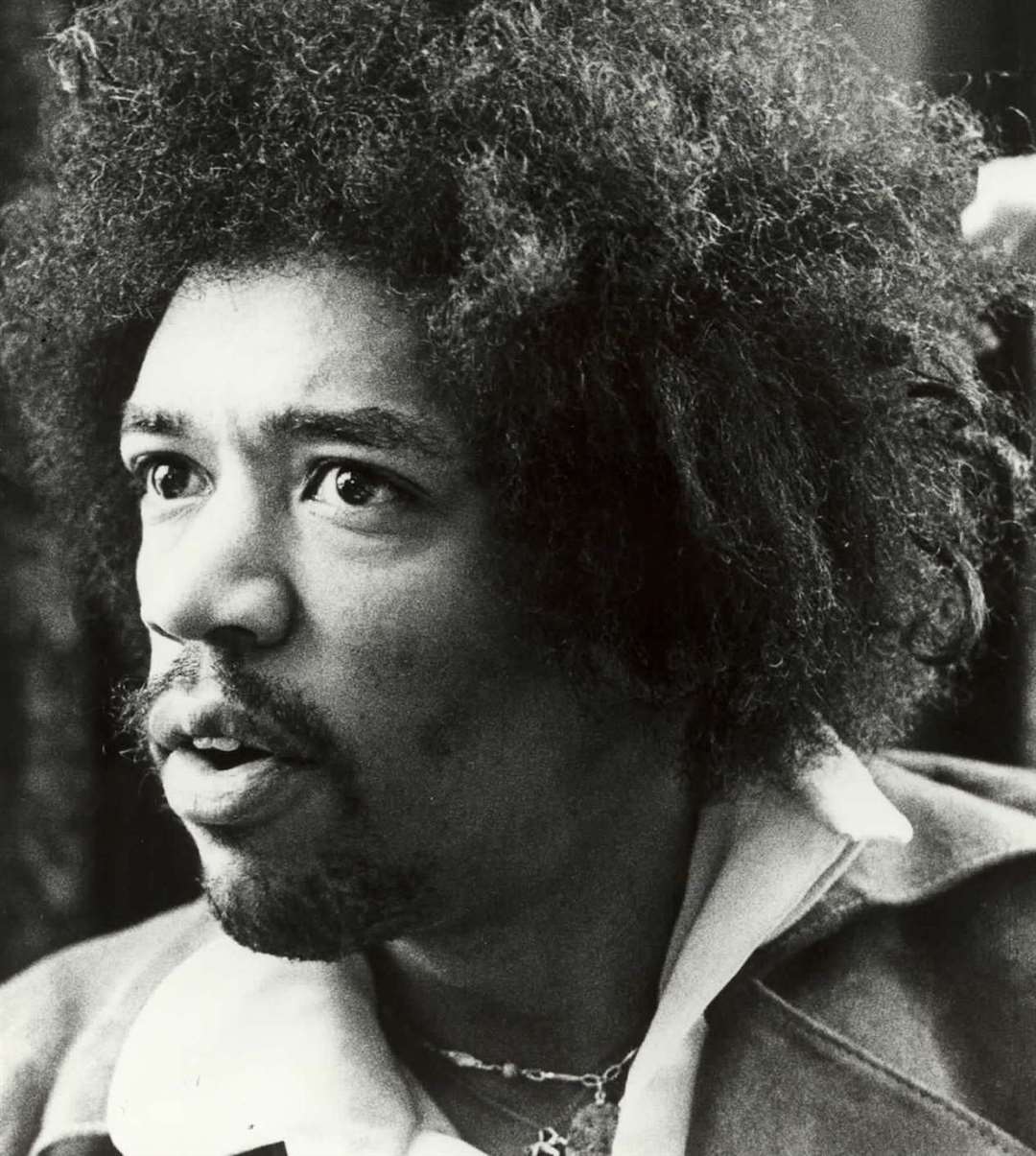

Most popular

‘My 11-year-old daughter will leave home at 7am and not get home till 5pm’

Headteacher leaves notes on neighbours’ cars in parking row

Road sealed off after body discovered

Family pay tribute to ‘kind-hearted’ man who died after town centre attack

‘This road is contender for worst in Kent’

Search our new digital news archive
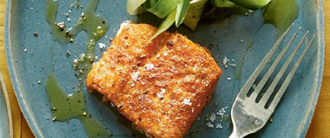
What's for dinner? Plan meals, try new foods and explore cuisines with tested recipes from the country's top chefs.

Education Directory
Trying to find the right nursery, school, college, university or training provider in Kent or Medway? Our Education Directory has everything you could possibly need!
Helpful links
- Contact Us and KM offices
- Send us your story
- Terms and conditions
- Buy a Photo
- Privacy Policy
- Kent Business
- My Kent Family
- Kent Wedding Day
- Destination Kent
- Local Businesses
- My Kent Website
- KM Media Group

This website and its associated newspaper are members of the Independent Press Standards Organisation (IPSO)
© KM Group 2024
Tickets Search
Dave robinson (an evening with stiff records), leeds irish centre, information, sunday 14.05.2023, further information.
An evening with Dave Robinson, co-founder of Stiff Records. Videos, songs and a Q&A session. As a teenage music photographer in Dublin to the owner of the first ever Beat club in Ireland, Dave Robinson was intertwined with music from the beginning. He took pictures for Rave magazine at the Cavern with the Beatles, documented the Rolling Stones’ first tour of Ireland; He befriended and briefly managed Van Morrison. He was then dropped in the deep end on his first trip to America becoming Jimi Hendrix’s Road and Tour manager with Pink Floyd, The Nice and The Move. Moving in with Jimi and Noel Reading to their London pad he continued to tour with The Experience across America and the world until just before Jimi’s untimely death. With a taste for the often perilous circuit that was music touring, Dave would go on to be involved in a number of major tours including but not limited to The Animals, The Young Rascals and the Vanilla Fudge. Partying and meeting characters along the way such as The Grateful Dead, Janice Joplin, The Who, Jim Morrison and the Doors. Dave would take all of this roadside education with him on his journey into to proper artist management, something he witnessed being done very poorly for a lot of musicians. Creating a 35 strong list of pubs across London where his bands Brinsley Schwartz, Graham Parker, Nick Lowe, Dave Edmonds, Ian Dury and Elvis Costello could play. Dave went to build a recording with Jake Riviera above his favourite pub The Hope and Anchor in Islington where he would record artists such as Elvis Costello and Mike and the mechanics. All of this experience would lead to Stiff Records and signings of legendary acts such as: The Damned, Motorhead, Elvis Costello, Nick Lowe,Tracey Ullman, The Plasmatics, Jona Lewie, Ian Dury & The Blockheads, Kirsty McColl, The Box Tops, The Adverts, Lene Lovich, Shane McGowan & The Pogues, Madness and many many more. After Stiff, Dave was installed by Chris Blackwell as president of Island Records, where he oversaw the careers of U2, Robert Palmer, Stevie Winwood, & Frankie Goes to Hollywood. He personally compiled and marketed Bob Marley’s 44 million selling LEGEND album. The biggest reggae album in the World. He represented Rick Rubin running Def Jam Records and American Recordings outside North America working with Johnny Cash, the Black Crows, Slayer, Danzig and the Jayhawks. He settled the vicious two year litigation between Rick Rubin and Roger Ames, Chairman of PolyGram and signed American Recordings to BMG. Dave then ran The Famous Blue Note Club and Acid Jazz Label in London helping to launch the Drum and Bass dance movement. Dave has been at the helm or in the mix of the most exciting and important musical developments and he is still active in the music industry as a consultant for various labels and projects - from Van Morrison for EMI to everyone inbetween
Venue Information
Want to receive all the latest news from jumbo straight to your inbox.

Jumbo Records
1-3 Merrion Centre
Google map: Cick here
Tel: 0113 245 5570
Email: [email protected]
Web: www.jumborecords.co.uk
Opening Hours
Mon 9:30am -5:30pm
Tues 9:30am -5:30pm
Wed 9:30am -5:30pm
Thurs 9:30am -5:30pm
Fri 9:00am -5:30pm
Sat 9:00am -5:30pm
Sun 11am - 5pm
Postage Information | Terms & Conditions | Privacy Statement | Site Map
Jumbo Records Limited. Registered at Companies House under No 08940926. Registered Office: 1-3 Merrion Centre, Leeds, LS2 8NG
Design + Build = BenRobertson.co.uk

Dave Robinson
Free your mind.
“IF IT AIN’T STIFF …. IT AIN’T WORTH A F@#!”
Dave Robinson, co-founder of Stiff Records is one of the music industry’s true legends responsible for launching the careers of some of the UK’s biggest names: Elvis Costello, Ian Dury, Kirsty McColl, Madness, and The Pogues.
Dave befriended and managed Van Morrison who slept on his couch for 9 months, was Road and Tour manager for Jimi Hendrix, and also did major tours in the US with Eric Burdon & The Animals, The Young Rascals and Vanilla Fudge. He partied and clubbed with The Grateful Dead, Janis Joplin, The Who, Jim Morrison and The Doors.
In addition, he managed Brinsley Schwarz, Graham Parker, Nick Lowe, Dave Edmunds, Ian Dury and Elvis Costello. With Jake Riviera, he started Stiff Records and signed The Damned, Motorhead, Elvis Costello, Nick Lowe, Tracey Ullman, The Plasmatics, Jona Lewie, Ian Dury & The Blockheads, Kirsty McColl, The Box Tops, The Adverts, Lene Lovich, The Pogues, Madness and many more.
Eventually, he headed up Island Records where he oversaw the careers of U2, Robert Palmer, Frankie Goes to Hollywood amongst others.
He was also responsible for the creation of 25 London pub music venues including the legendary Hope & Anchor in Islington – recently refurbished and back again hosting live music.
Latest Episode
Frre Your Mind

Dave Robinson's Stiff REcords Tour
Follow this organiser to stay informed on future events, events you might like, cornwall and isles of scilly biological recorders conference 2024 cornwall and isles of scilly biological recorders conference 2024, april ecstatic dance @scorrier house with guest dj dave sir vinyl april ecstatic dance @scorrier house with guest dj dave sir vinyl, mad dog mcrea - autumn tour mad dog mcrea - autumn tour, the urban voodoo machine - on tour the urban voodoo machine - on tour, mother vulture - the break me 2024 tour mother vulture - the break me 2024 tour, tankus the henge - album debut 10th anniversary tour tankus the henge - album debut 10th anniversary tour, ed & taylor | the tribute tour of the year | st austell ed & taylor | the tribute tour of the year | st austell, tension release & muscle recovery tension release & muscle recovery, a history tour of boconnoc house with elizabeth fortescue a history tour of boconnoc house with elizabeth fortescue, funke and the two tone baby - the reacclimate tour funke and the two tone baby - the reacclimate tour.
Moscow Metro Underground Small-Group Tour - With Reviews & Ratings
Moscow metro underground small-group tour.
- See more images
Tour Information
Key Details
- Mobile Voucher Accepted
- Free Cancellation
- Duration: 3 Hrs
- Language: English
- Departure Time : 10:00 AM
- Departure Details : Karl Marks Monument on Revolution Square, metro stop: Square of Revolution
- Return Details : Metro Smolenskaya
- If you cancel at least 4 day(s) in advance of the scheduled departure, there is no cancellation fee.
- If you cancel within 3 day(s) of the scheduled departure, there is a 100 percent cancellation fee.
- Tours booked using discount coupon codes will be non refundable.
Go beneath the streets on this tour of the spectacular, mind-bending Moscow Metro! Be awed by architecture and spot the Propaganda , then hear soviet stories from a local in the know. Finish it all up above ground, looking up to Stalins skyscrapers, and get the inside scoop on whats gone on behind those walls.
Know More about this tour
We begin our Moscow tour beneath the city, exploring the underground palace of the Moscow Metro. From the Square of Revolution station, famous for its huge statues of soviet people (an armed soldier, a farmer with a rooster, a warrior, and more), we’ll move onto some of the most significant stations, where impressive mosaics, columns, and chandeliers will boggle your eyes! Moreover, these stations reveal a big part of soviet reality — the walls depict plenty of Propaganda , with party leaders looking down from images on the walls. Your local guide will share personal stories of his/her family from USSR times, giving you insight into Russia’s complicated past and present. Then we’re coming back up to street level, where we’ll take a break and refuel with some Russian fast food: traditional pancakes, called bliny. And then, stomachs satiated, we are ready to move forward! We’ll take the eco-friendly electric trolleybus, with a route along the Moscow Garden Ring. Used mainly by Russian babushkas(grannies) during the day, the trolleybus hits peak hours in the mornings and evenings, when many locals use it going to and from their days. Our first stop will be the Aviator’s House, one of Stalin’s Seven Sisters, followed by the Ministry of Foreign Affairs — and you’ll hear the legends of what has gone on inside the walls. Throughout your Moscow tour, you’ll learn curious facts from soviet history while seeing how Russia exists now, 25 years after the USSR.
Local English-speaking guide
Pancake snack and drink
Additional food and drinks
Tickets for public transport
Souvenirs and items of a personal nature
Tips and gratuities for the guide
Additional Info
Confirmation will be received at time of booking
Dress standard: Please wear comfortable shoes for walking. For your Urban Adventure you will be in a small group of a maximum of 12 people
Traveler Reviews
This tour exceeded our expectations. Nikolai (Nick), our tour guide, was very knowledgeable, thorough, and has a great personality. He didn't take shortcuts and really covered everything that was on the agenda in great detail. We saw beautiful metro stations and learned the history behind them, including many of the murals and designs.
We did the tour with Anna her knowledge and understanding of the History surrounding the metro brought the tour alive. Well done Anna!
This tour was amazing!
Anna was a great tour guide. She gave us heaps of interesting information, was very friendly, and very kindly showed us how to get to our next tour.
Amazing beauty and history.
An excellent tour helped by an absolutely amazing guide. Anna gave a great insight into the history of the metro helped by additional material she had prepared.
great tour and guide - thanks again
great will do it again, Miriam ke was very good as a guide she has lived here all here life so knew every interesting detail.a good day

Tour Details
Moscow metro tour: architectural styles of the subway.

Duration: 2 hours
Categories: Culture & History, Sightseeing
This metro tour of Russia’s capital and most populous city, Moscow, is your chance to get a unique insight into the beautiful and impressive architecture of the city's underground stations. Admire their marble walls and high ceilings representing Stalin's desire for glory after World War 2, and see first-hand how the interiors change with the rise of new political eras. Your guide will lead you through the complex network, which is one of the most heavily used rapid transit systems worldwide, with over two billion travelers in 2011.
Opened in 1935, Moscow’s underground system, now 190 miles (305 km) long with 185 stations, is today one the largest and most heavily used rapid transit systems in the world. On this Moscow metro tour, discover the impressive architecture of Moscow’s underground stations and learn how they reflect the Soviet era.
Getting around by metro, your local guide will take you through parts of Moscow’s infamous history. Stop at stations built during the time of the USSR (Soviet Union) that are praised as one of the most extravagant architectural projects from Stalin’s time. After World War 2, he was keen on establishing Stalinist architecture to represent his rising regime and a recognized empire. Learn how when his successor started the de-Stalinization of the former Soviet Union in 1953, the extravagancy of the architecture was toned down.
Discover how the unique character of each station reflected several different eras. While stations like Kievskaya and Slavyansky Bulvar have pompous halls and high stucco ceilings brimming with extravagant decorations, those built later, like Volzhskaya, are lightly adorned with sparse furnishings. Architect Alexey Dushkin and painter Alexander Deyneka were just two of the many artists who made these magnificent landmarks possible.
Revel in Moscow's glory days, as well as the years of scarcity, on this fascinating Moscow metro experience. Conclude your tour at one of the central stations in Moscow. If you're lucky, you may even find the secret entrance to the unconfirmed Metro-2, a parallel underground system used by the government -- a mystery which has neither been denied nor confirmed today.
Nearby tours

Soviet-Era Walking Tour in Moscow: Lubyanka Square and the Gulag History Museum
If you love history, would like to know more about Russia’s past, or just want to take an interesting walk, book this guided Moscow walking tour of Soviet-era sites. With your expert guide, walk through Lubyanka Squ...

Walking Tour of Moscow's Kolomenskoye Estate
On this walking tour through the Kolomenskoye Estate in Moscow, immerse yourself in Russia’s interesting royal history. Walk around the UNESCO World Heritage-listed Ascension Church, built in 1532, and enter the Hou...

Moscow Cultural Walking Tour: Red Square, Kitay-Gorod and St Basil's Cathedral
Take a guided walking tour of Moscow's cultural highlights, like the beautiful UNESCO World Heritage-listed Red Square, said to be the central square of Russia. Walk through the adjoining district Kitay-Gorod, one of ...

Kremlin Grounds, Cathedrals and Patriarch's Palace Tour from Moscow
A great three hour tour exploring the Kremlin Grounds, Cathedrals and Patriarch's Palaces in Moscow! The small city in the center of Moscow, once the residence of Czars and Patriarchs, contains Russia's main cathedra...

Moscow City Tour
The Moscow City Tour covers all the highlights and most beautiful places in the enchanting Russian capital. The tour begins with a stop at the Red Square and St. Basil's Cathedral, the architectural masterpiece and w...
Culture Shock Rating
We have a wide range of tours designed to give you an insight into the destination you're travelling in and there is something for everybody. The culture shock ratings considers the destination visited, transport used, activities undertaken and that "Wow, I'm really not at home now!" factor. While generalisations are always tricky, a summary of our gradings is as follows…
This is the least confronting of our tour range. Transport used on the trip is either private or a very comfortable public option, the activities included are usually iconic sites and locations that are not all too confronting.
The tour can include a mix of private and public transport providing a level of comfort that is slightly below what you would experience at home. Sites visited are usually iconic sites, tours can also include market visits, visits to communities etc that provide the traveller with a fantastic insight into destination.
Expect to rough it for parts of this tour, whether it's a packed public bus where you are forced to stand, a visit to a local market, a local community, you are sure to have an experience that is very different from what you're used to at home.
The comforts of your home town and the environment you are used to are more of a rarity. Expect some challenging transport options, visits to local sites and areas that don't resemble anything at home.
You're out there in the global community! You are likely to be exposed to the elements, travel in whatever means of transport is available and basically take it as it comes, whatever comes! It can be tough.
Physical Rating
Our physical rating gives you an idea of how much huffing and puffing you can expect on the tour. While generalisations are always tricky, a summary of our gradings is as follows…
These tours have very limited physical activity. Usually climbing in and out of the transport provided, walking through sites, markets etc included in the itinerary.
These tours have a bit of physical activity but nothing that should challenge you too much. This could be climbing on and off public transport through to a walk through the destination you're travelling in, they can include walking only tours or a combination of walking and transport.
These tours involve a bit of physical activity from walking up and down hills in the destination you're travelling in or the surrounding areas. Climbing on and off local transport or riding a bike up to 30 kms along predominantly flat terrain or jumping in a kayak for a gentle paddle on flat water.
These Tours will provide you with some solid physical activity. Whether its bike riding, walking, trekking, kayaking or riding on public transport you will need to have a good level of fitness to enjoy this tour.
Be prepared for some serious physical activity. These tours are our most challenging and involve some serious walking, hiking or bike riding. Can involve step climbs by foot or pedal and some challenging public transport options in the destination you are travelling.
Luxury Rating
Some trips are like a stroll on the beach, while others have you trekking alpine passes. Some of you thrive on camping out on the savannah, while others may prefer a hot shower and a comfortable bed in a lodge. Follow the grading systems below to find the right trip for you.
To help you choose the trip that's right for you, we've broken all of our trips down into four service levels. Measuring the comfort level of the accommodation and transport. So whether you're travelling on a budget and want to save money by using public transport, or prefer upgraded accommodation and are happy to pay a little more, then we have a level for you.
This is grassroots travel at its most interesting
Authentic experiences with some of the comforts of home
For those who like to travel in comfort
All the unique experiences wrapped up with a gold ribbon
- Preplanned tours
- Daytrips out of Moscow
- Themed tours
- Customized tours
- St. Petersburg
Moscow Metro
The Moscow Metro Tour is included in most guided tours’ itineraries. Opened in 1935, under Stalin’s regime, the metro was not only meant to solve transport problems, but also was hailed as “a people’s palace”. Every station you will see during your Moscow metro tour looks like a palace room. There are bright paintings, mosaics, stained glass, bronze statues… Our Moscow metro tour includes the most impressive stations best architects and designers worked at - Ploshchad Revolutsii, Mayakovskaya, Komsomolskaya, Kievskaya, Novoslobodskaya and some others.
What is the kremlin in russia?
The guide will not only help you navigate the metro, but will also provide you with fascinating background tales for the images you see and a history of each station.
And there some stories to be told during the Moscow metro tour! The deepest station - Park Pobedy - is 84 metres under the ground with the world longest escalator of 140 meters. Parts of the so-called Metro-2, a secret strategic system of underground tunnels, was used for its construction.
During the Second World War the metro itself became a strategic asset: it was turned into the city's biggest bomb-shelter and one of the stations even became a library. 217 children were born here in 1941-1942! The metro is the most effective means of transport in the capital.
There are almost 200 stations 196 at the moment and trains run every 90 seconds! The guide of your Moscow metro tour can explain to you how to buy tickets and find your way if you plan to get around by yourself.

IMAGES
VIDEO
COMMENTS
David Robinson (born 14 May 1944), nicknamed Robbo, is an Irish music executive, music video director, record producer, music manager, and photographer. He is best known as the co-founder with Jake Riviera of Stiff Records where he signed up The Damned, Tracey Ullman, Kirsty MacColl, The Pogues, and Madness.He had also managed Elvis Costello, Nick Lowe, Dave Edmunds and Ian Dury before signing ...
Stiff Records was the brainchild of Robinson and his partner Andrew Jakeman, aka Jake Riviera, a couple of sharp-eyed wide-boy hustlers with music business form of their own as managers of the bands Kilburn And The High Roads and Chilli Willi And The Red Hot Peppers respectively. ... During the 1980 Son Of Stiff coach tour, Edward wrote Swords ...
Stiff Records is a British independent record label formed in London, England, by Dave Robinson and Jake Riviera.Originally active from 1976 to 1986, the label was reactivated in 2007. Established at the outset of the punk rock boom, Stiff signed various punk rock and new wave acts such as Nick Lowe, the Damned, Lene Lovich, Wreckless Eric, Elvis Costello, Ian Dury, and Devo, also signing ...
Dave Robinson gives a presentation. Photo by Milo Robinson. By Dave Schulps. I first encountered Dave Robinson's name in the production credits of two Brinsley Schwarz albums acquired during a visit to United Artists Records' New York office in late 1972.
David Robinson, nicknamed Robbo, is an Irish music executive, music video director, record producer, music manager, and photographer. He is best known as the co-founder of Stiff Records. Stiff Records is a British independent record label formed in London, England, by Dave Robinson and Jake Riviera. Originally active from 1976 to 1986, the ...
Dave Robinson is a naturally engaging person - he must be to have had such an amazing life. Surprise, fun, laughter and a real insight into the workings of the music industry. Dave Robinson (Stiff Records) with his one man show at The Petri Dish. The night will be covering a broad range with Stories & Video and have a Q & A at the end with ...
Music in Edinburgh Business in Edinburgh Live-music in Edinburgh Art in Edinburgh. It's more fun with friends. Share with friends. An evening with Dave Robinson (Stiff Records Tour) happening at Leith Depot, 140 Leith Walk, Edinburgh, United Kingdom on Thu May 04 2023 at 07:30 pm to 10:30 pm.
Dave "Robbo" Robinson's Stiff Tour - Hear the crazy exploits of the man who was Stiff Records. BUY TICKETS
If It Ain't Stiff …. It Ain't Worth A F@#!. The Irrepressible Co-Founder Ofstiff Records Is Visiting A Town Near You With More Anecdotes, Great Music & Stories. He Managed Van Morrison, Tour Managed Jimi Hendrix, Eric Burden & The Animals And More. He Partied With The Grateful Dead, Janice Joplin, The Who, Jim Morrison And The Doors.
Dave Robinson brings The Stiff Records story to Liberty Hall Theatre on Saturday 29 February 2020. As a teenager Dave was a photographer in Dublin and helped to open the first Beat Club in Ireland, Sound City . Taking pictures for Rave Magazine at The Cavern with The Beatles, and on The Rolling Stones first tour of Ireland, he befriended Van ...
The tour took the bands from Bristol in the South West to Wick in Scotland on a specially commissioned, logo emblazoned train. All the artists played short sets every night for over a month, in a 2½ hour, revue-style show and all five of them had albums released mid-tour on the same day. "The train tour was typical Stiff," admits Robinson ...
An evening with Dave Robinson (Stiff Records Tour) at Leith Depot, 140 Leith Walk, Edinburgh, United Kingdom on Thu May 04 2023 at 07:30 pm to 10:30 pm ... share Advertisement. Dave "Robbo" Robinson's Stiff Tour - Hear the crazy exploits of the man who was Stiff Records About this Event. The Damned, Madness, The Pogues, Elvis Costello, Ian Dury ...
DETAILS. Dave Robinson is at HUSH upstairs at The Eleto Chocolate Cafe at 12-14 Rendezvous Street, Folkestone, on Friday, October 18. Doors open at 7.30pm, for 8pm. For tickets at £14 go to ...
Open Menu Close Menu. Dave Robinson
An evening with Dave Robinson, co-founder of Stiff Records. Videos, songs and a Q&A session. As a teenage music photographer in Dublin to the owner of the first ever Beat club in Ireland, Dave Robinson was intertwined with music from the beginning. He took pictures for Rave magazine at the Cavern with the Beatles, documented the Rolling Stones ...
Dave Robinson, co-founder of Stiff Records is one of the music industry's true legends responsible for launching the careers of some of the UK's biggest names: Elvis Costello, Ian Dury, Kirsty McColl, Madness, and The Pogues. Dave befriended and managed Van Morrison who slept on his couch for 9 months, was Road and Tour manager for Jimi ...
Dave Robinson, is an Irish born music man, a natural raconteur who has worked with and created some of pop and rock's most famous artists - He managed Van Morrison, tour managed Jimi Hendrix, Eric Burden & The Animals and more - As part of his job Dave hauled Jimi Hendrix out of his black satin sheeted bed (where he was with some ladies) in ...
The Longest Forty Production Co. Eventbrite - Leith Depot presents An evening with Dave Robinson (Stiff Records Tour) - Thursday, 4 May 2023 at Leith Depot, Edinburgh, Edinburgh. Find event and ticket information.
Dave Robinson's Stiff REcords Tour. View details. Follow this organiser to stay informed on future events. By OLD BAKERY STUDIOS. Follow. Events you might like. Beans On Toast - Winter Tour 2023. Beans On Toast - Winter Tour 2023. Tue, Dec 12, 19:00. Old Bakery Studios • Truro. £18.39.
Go beneath the streets on this tour of the spectacular, mind-bending Moscow Metro! Be awed by architecture and spot the Propaganda , then hear soviet stories from a local in the know. Finish it all up above ground, looking up to Stalins skyscrapers, and get the inside scoop on whats gone on behind those walls.
This metro tour of Russia's capital and most populous city, Moscow, is your chance to get a unique insight into the beautiful and impressive architecture of the city's underground stations. Admire their marble walls and high ceilings representing Stalin's desire for glory after World War 2, and see first-hand how the interiors change with the ...
Moscow has some of the most well-decorated metro stations in the world but visitors don't always know which are the best to see. This guided tour takes you to the city's most opulent stations, decorated in styles ranging from neoclassicism to art deco and featuring chandeliers and frescoes, and also provides a history of (and guidance on how to use) the Moscow metro system.
Moscow Metro. The Moscow Metro Tour is included in most guided tours' itineraries. Opened in 1935, under Stalin's regime, the metro was not only meant to solve transport problems, but also was hailed as "a people's palace". Every station you will see during your Moscow metro tour looks like a palace room. There are bright paintings ...